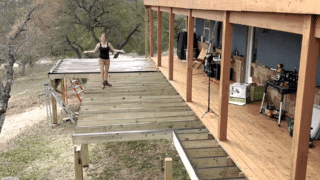
How To Rebuild Exterior Stairs
- Outdoor DIY Projects
- April Wilkerson
- Updated: February 26, 2023
Trying to figure out how to rebuild exterior stairs? Check out this DIY project where we replaced old worn down stairs with brand new ones we built ourselves!
Both Alma (Pink Soul Studios) and Erin (Maker Gray) are Makers/Builders and while Alma (who owns these stairs) could have tackled the stairs on her own, we offered to come help as I’ve built two sets and could speed up the process. Truthfully it was a great excuse for the three of us friends to hang out while being productive.
The staircase though was pretty worn out. There was plenty of rotten wood. Especially in the posts, as they were in direct contact with the ground.


The rise and run of the steps were all slightly different and the most problematic issue was there was no landing to the stairs. So when you came out of the house door, you would only have a few inches to stand. Then, if the door shut while you were standing there, it would boot you down the steps!

Ok now that you see the befores, lets get into the rebuilding process.
ISOtunes Bluetooth Hearing Protection
Bessey KlikClamps
Post Brackets
Joist Hangers
Stair Brass Blocks
Titebond Construction Adhesive
Post Level
The first step was to demo the existing staircase. In this particular instance though it wasn’t as easy as taking a sledge to it because there are two posts holding up an awning of the house. Before these can be removed, this awning needs to be supported in a different way so it doesn’t sag.
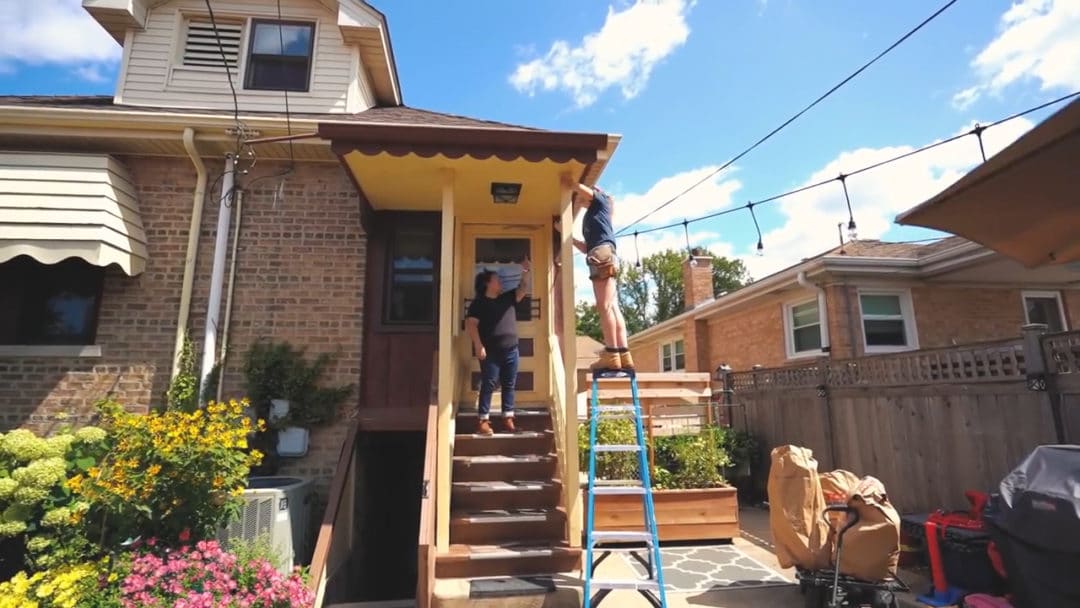
I didn’t want to just prop it up with two vertical posts and those be in the way of the already tight working quarters of the new stairs we would be building. So I decided to try more of a support beam/header type of holding.
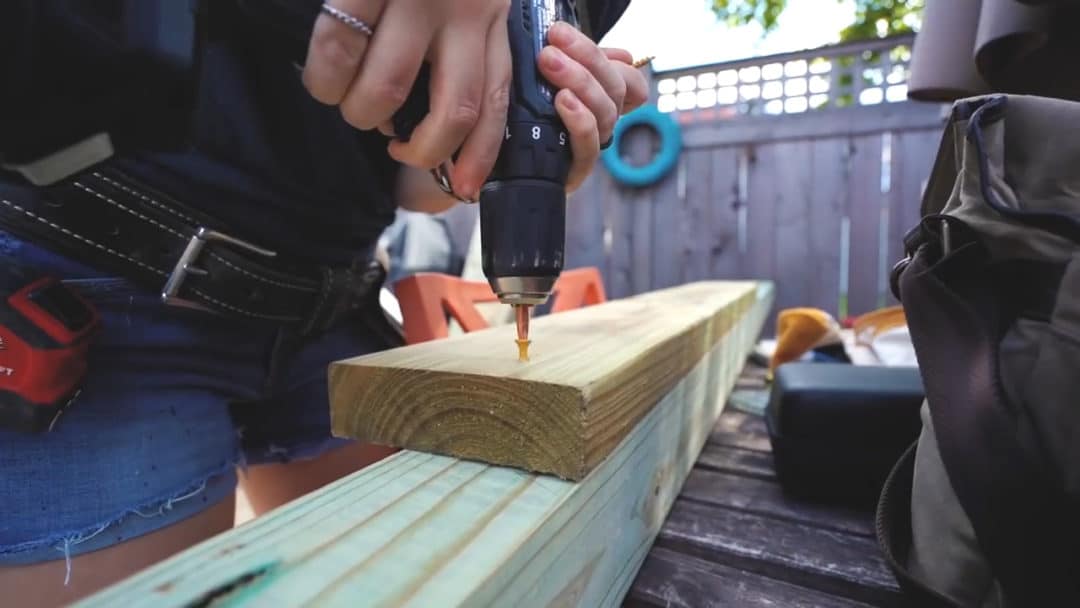
This would span horizontally across the entire awning, then vertical props would be used on either side, therefore pushing them a ways out from the building area. The thing to work around here is to not interfere with the siding which comes down about an inch on either side of the awning. To avoid knocking into this with our header, we first placed a 2x onto of the 4×4 we would be running across the awning.
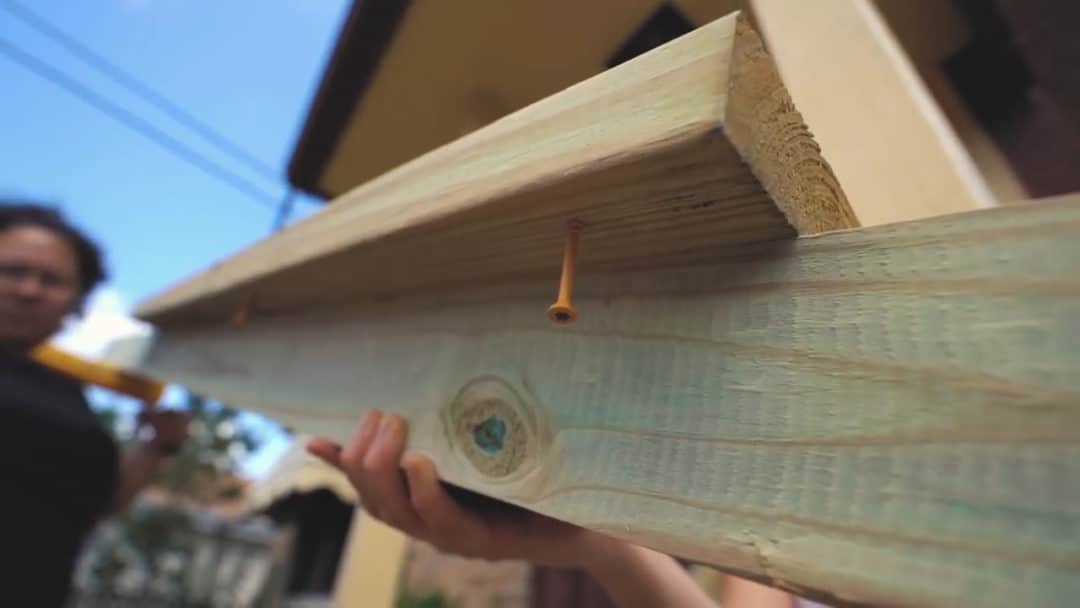
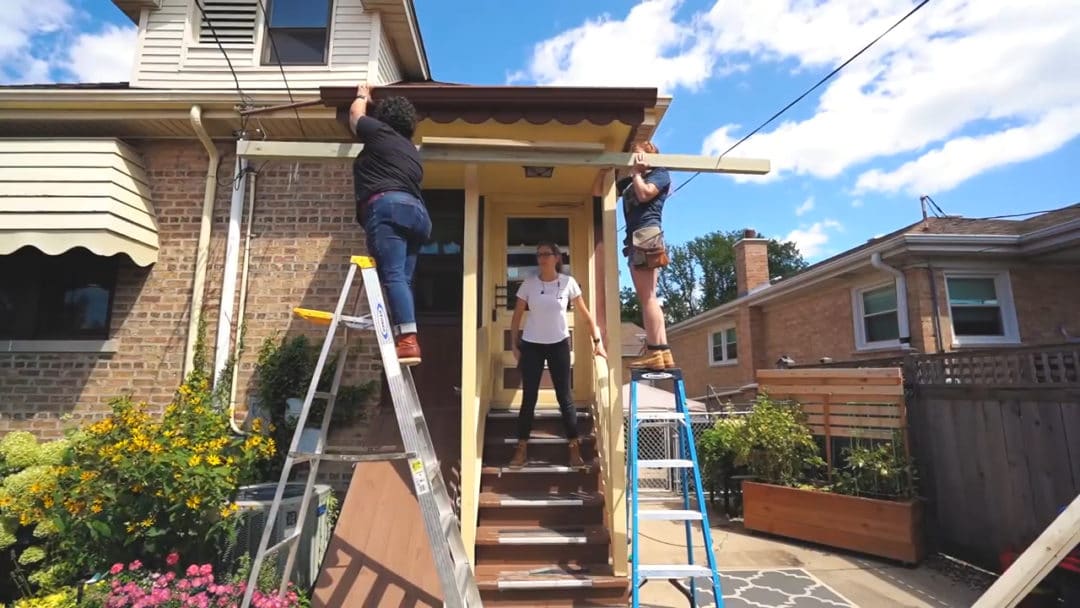
On top of building up the beam to miss the siding, this also gives us a way to secure it to the roof which would temporally hold it up, juuuuust in case one of the vertical props gets knocked while we are building and moving around it.
This is not light and we knew it would be a struggle to hold it up for a long period so we drove in screw along the 2x material so that as soon as Alma and I got the beam up the ladders and pressed flush to the roof, Erin could very quickly drive in the screws to secure it.
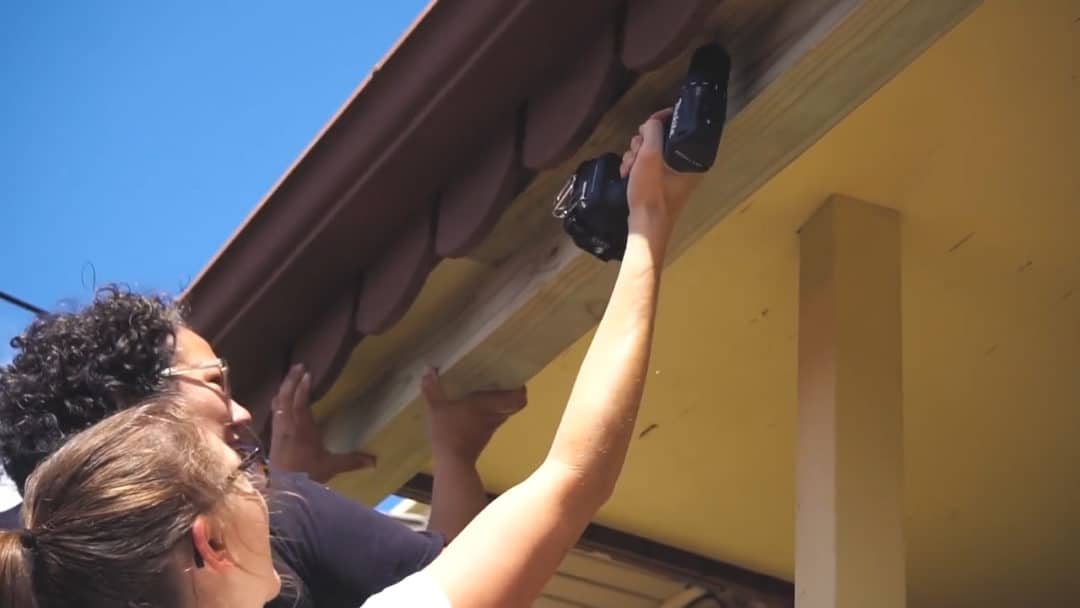
Whew, ok even though it’s held with screws, don’t stand under it.
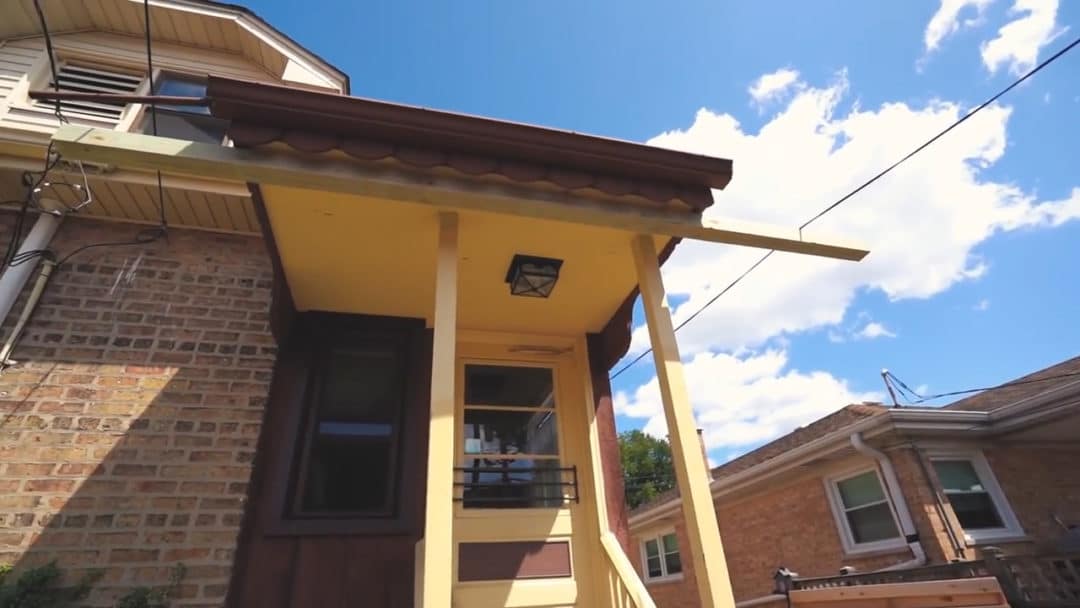
To make the vertical props we took a measurement then cut a 2x to length, attaching a short shoe to widen the footprint up at the top and stabilize it just a little bit more.
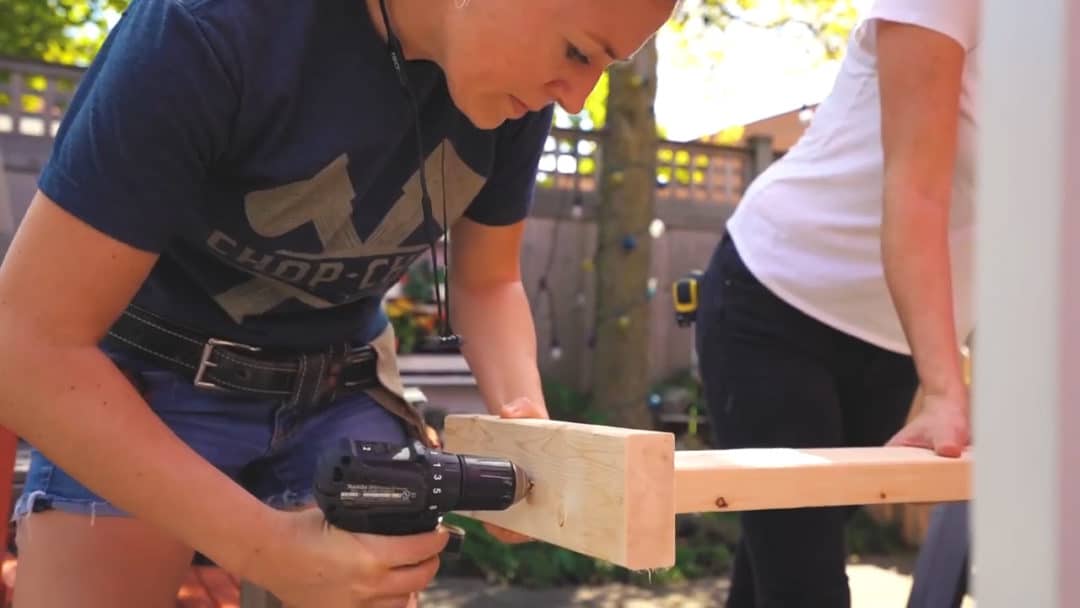
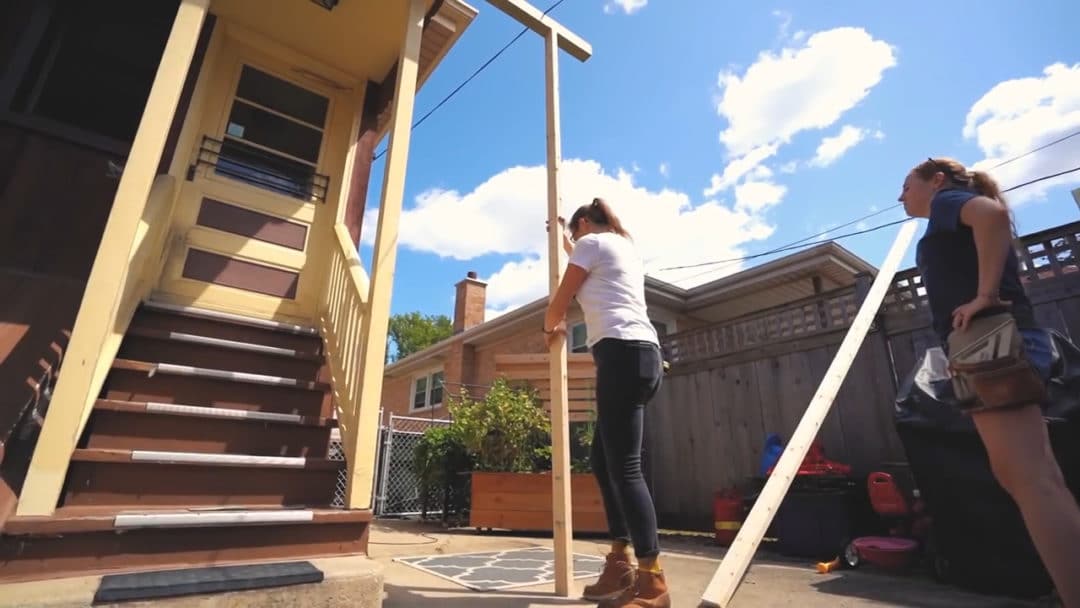
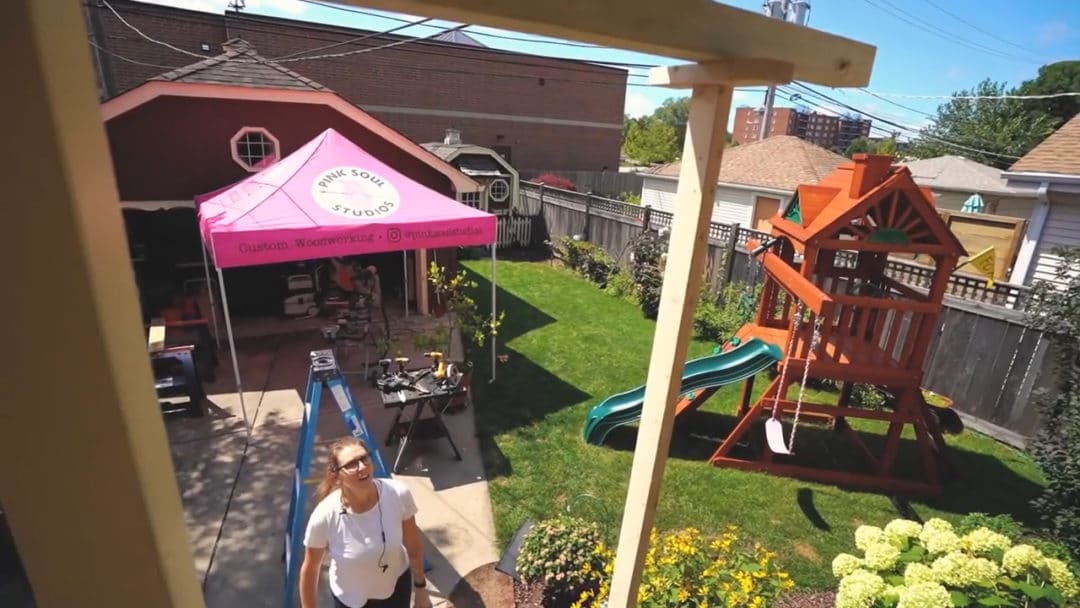
Alright, perfect. Now the awning is supported but the temporary props are also as out of the way as possible. Lets move on to demo.
I was expecting these old posts to go up into the rafters of the awning, but instead they were secured with nails and butted up to the bottom side. We used a sawzall to cut off the majority of the post then hammered out the small remaining chunk.
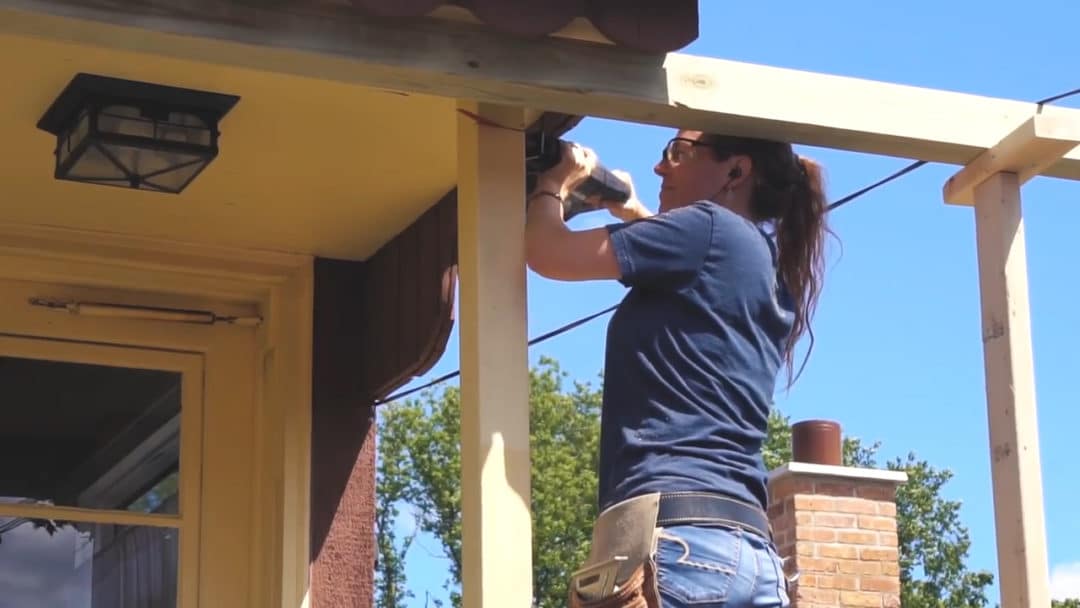
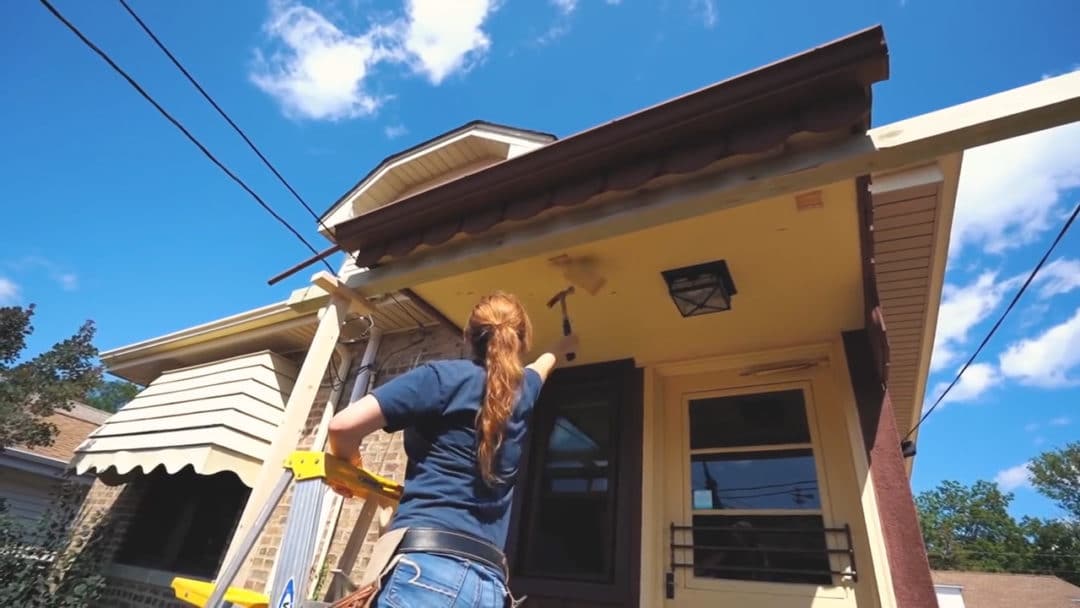
For the rest of the stairs we used a combo of tools to break it apart. Using a hammer or sledge when we didn’t need to be delicate…..and a demo blade when we did such as when we needed to remove the stringers from the house.
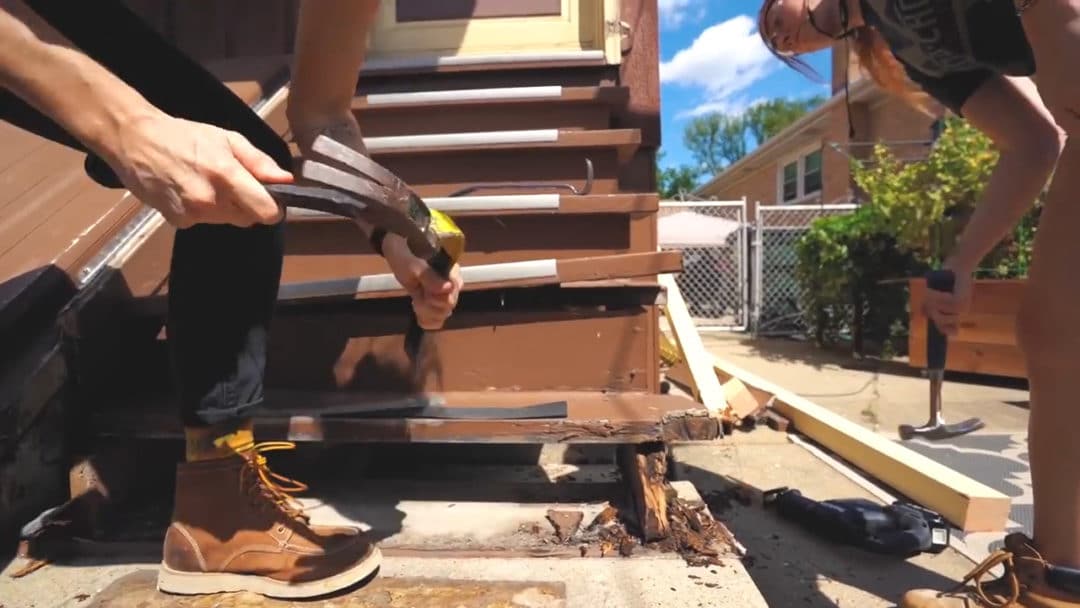
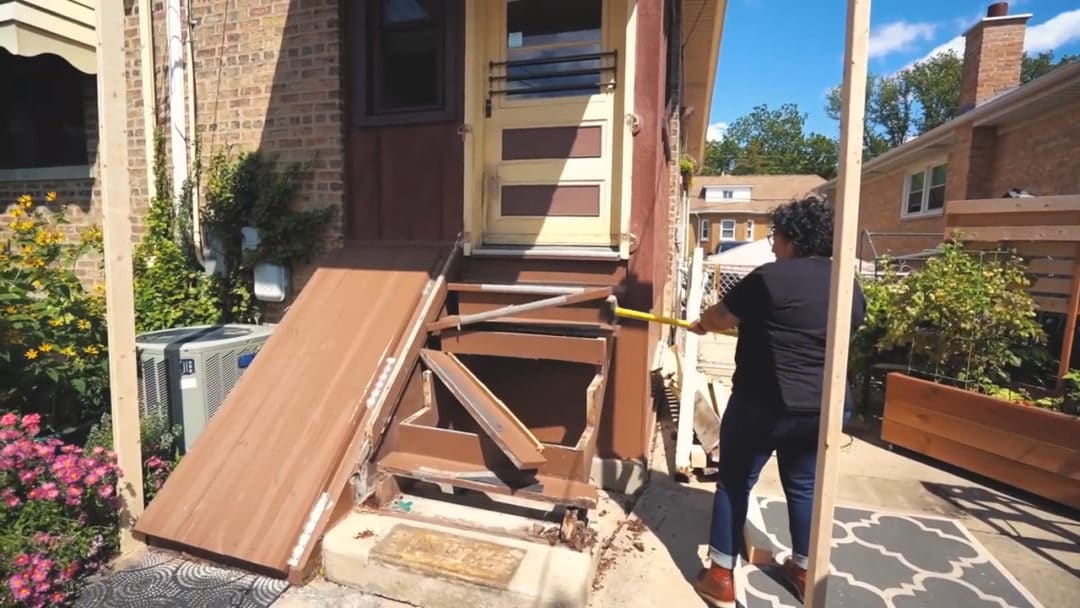
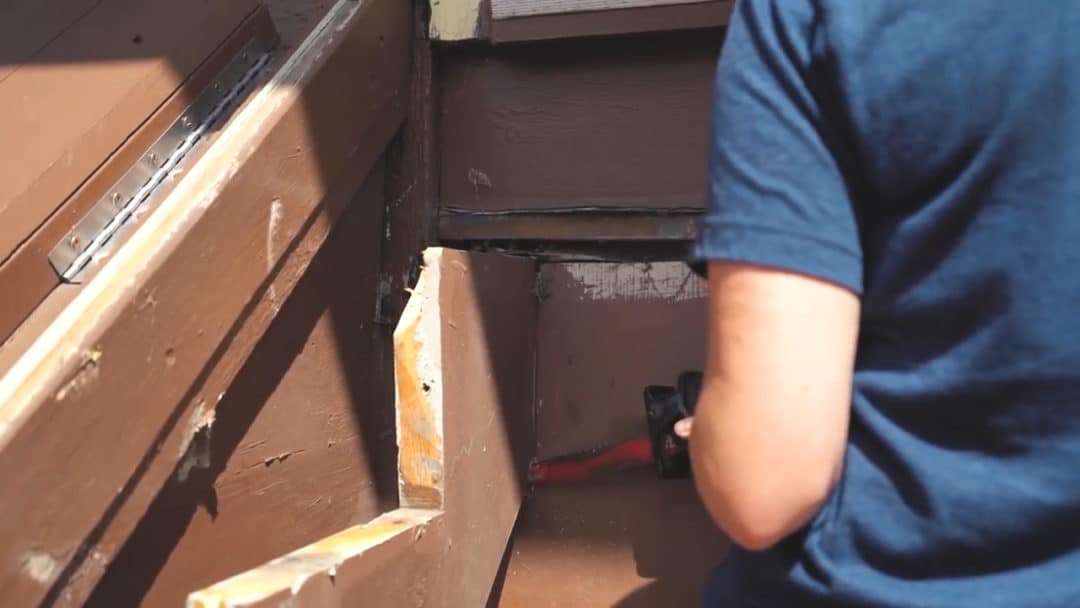
Now on to the next problem to sort….getting rid of this giant, meaning heavy, concrete step. This was, difficult and we tried an assortment of things.
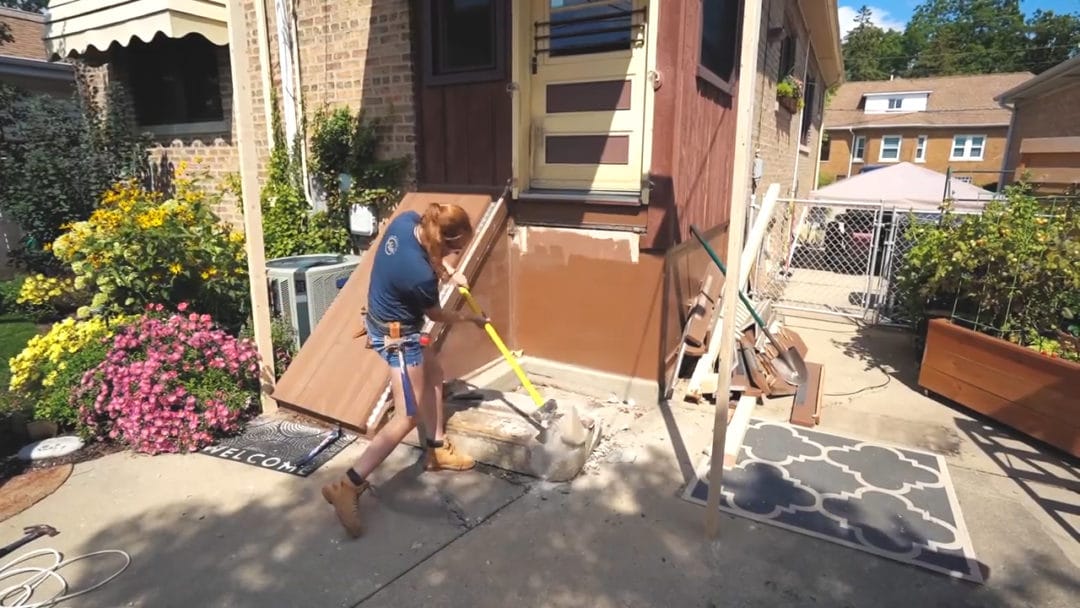
I hoped it would break up easily, but after working hard to bust up just a corner or two we saw it had rebar in it. So our next hope was to try and move it.
A long rock bar would make this job a lot easier but Alma didn’t have one so we made due with the tools she did have, which was a shovel, a pry bar, leverage, and a strap. The goal was to get a strap around it then try pulling it. We didn’t get far with that, so next we threw a dolly and a few furniture dollies into the mix.
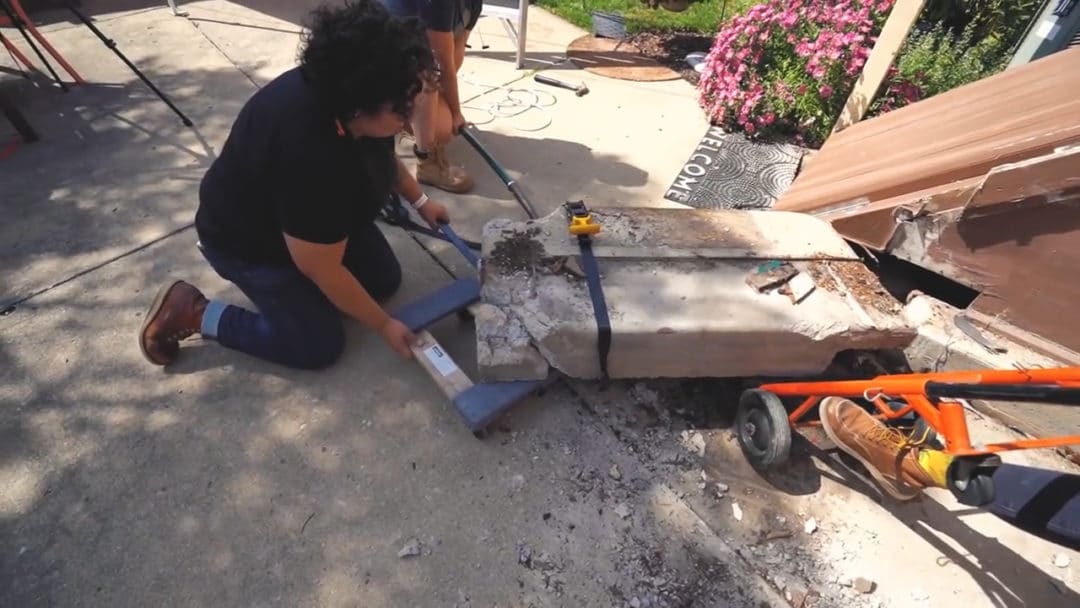
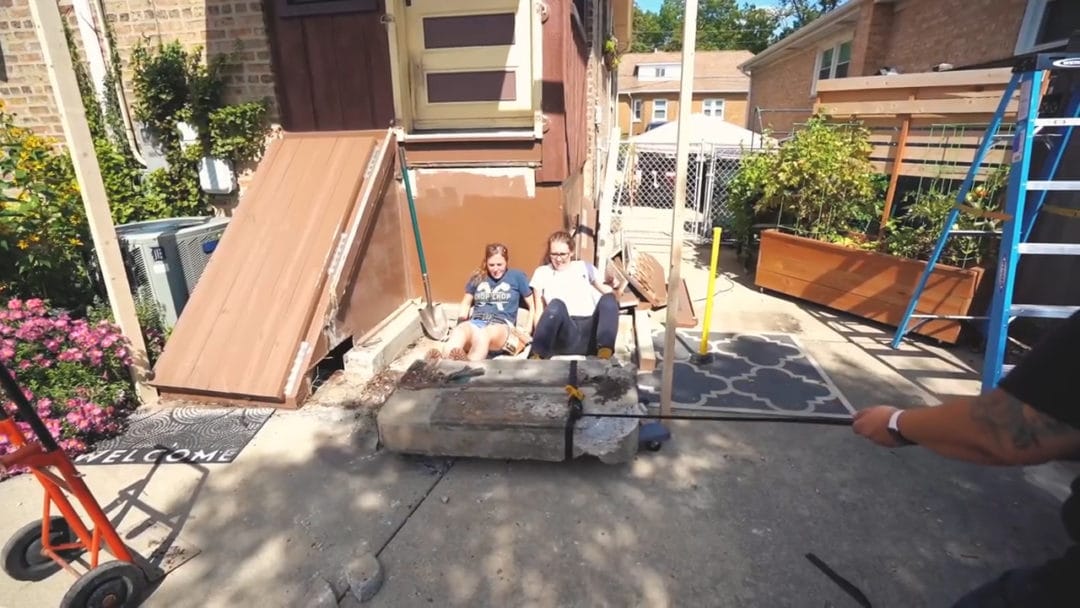
After getting it up on two, we were able to heave the close to 500 lbs block out of the way. Not very far, but just enough to get on with the build.
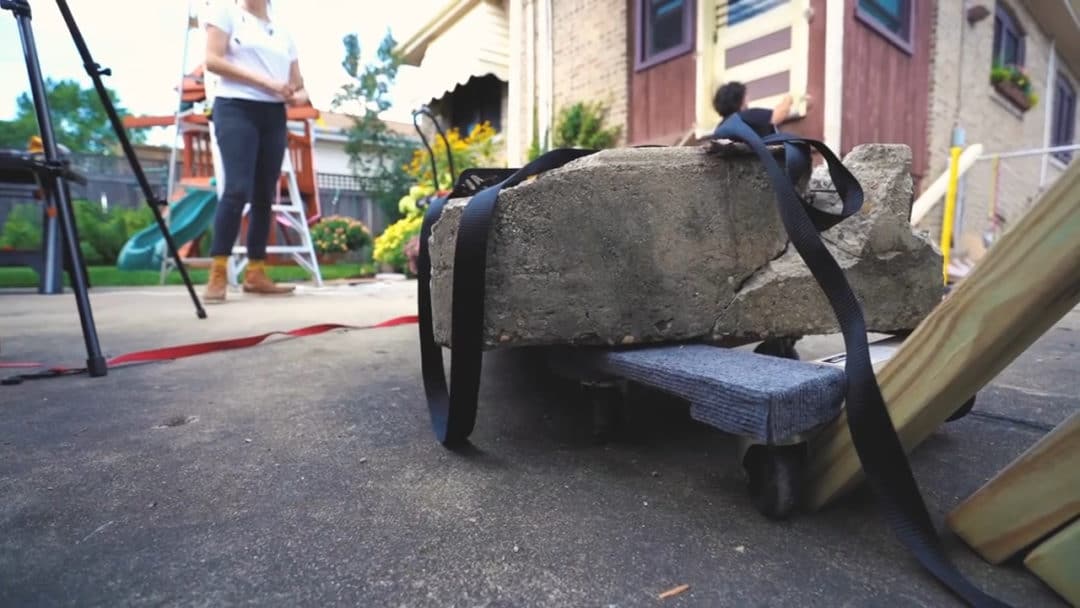
Ok so the first step in the rebuilding process was to build out the landing.
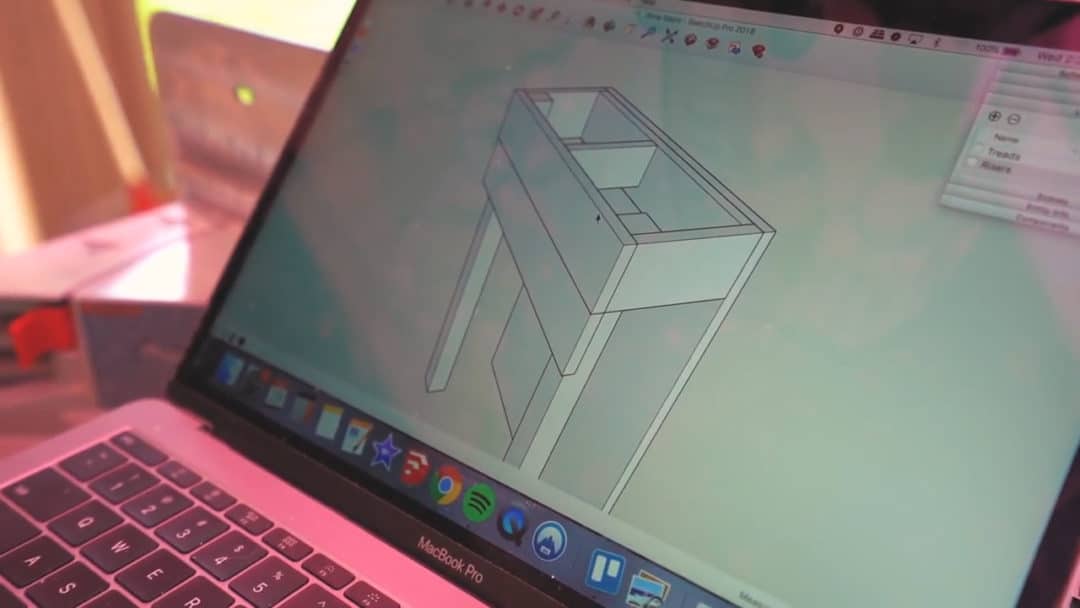
This will give them a proper standing area instead of just having a few inches before heading into the doorway. Be sure to check with the your local building codes here as many stipulate a minimum on what this landing needs to be.
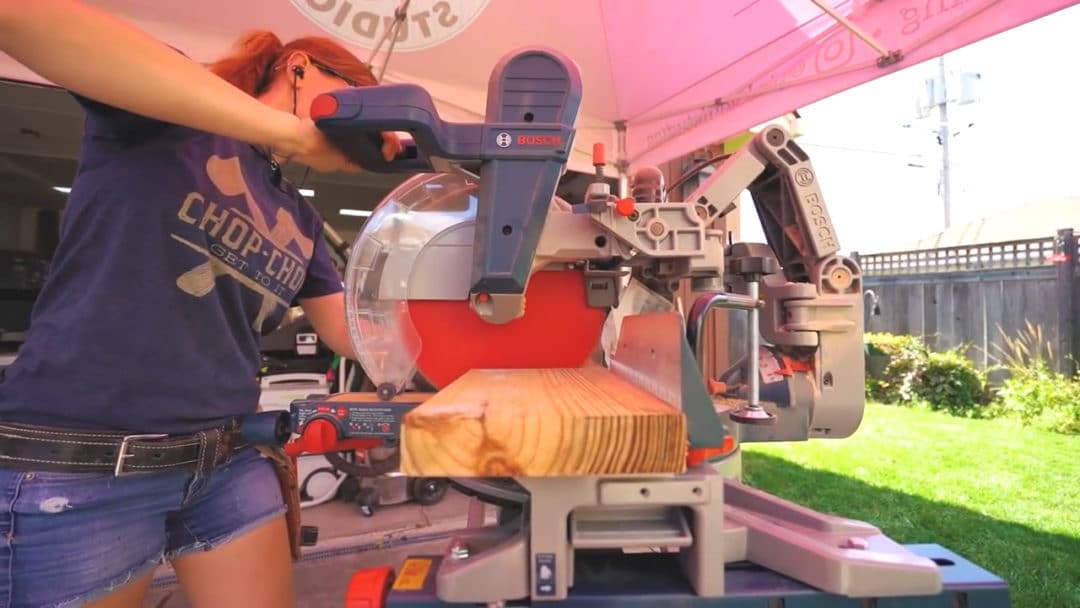
We first cut a header and attached the two outside framing members to it before moving it into place right under the doorway.
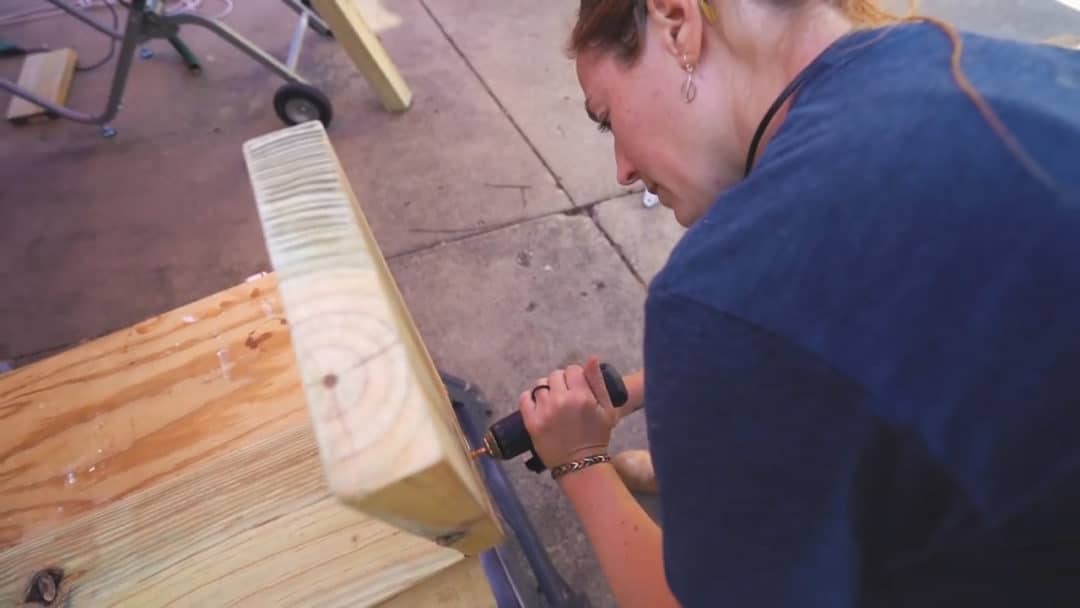
This needs to be placed so that when the decking material is attached on top it will be flush with the existing threshold.
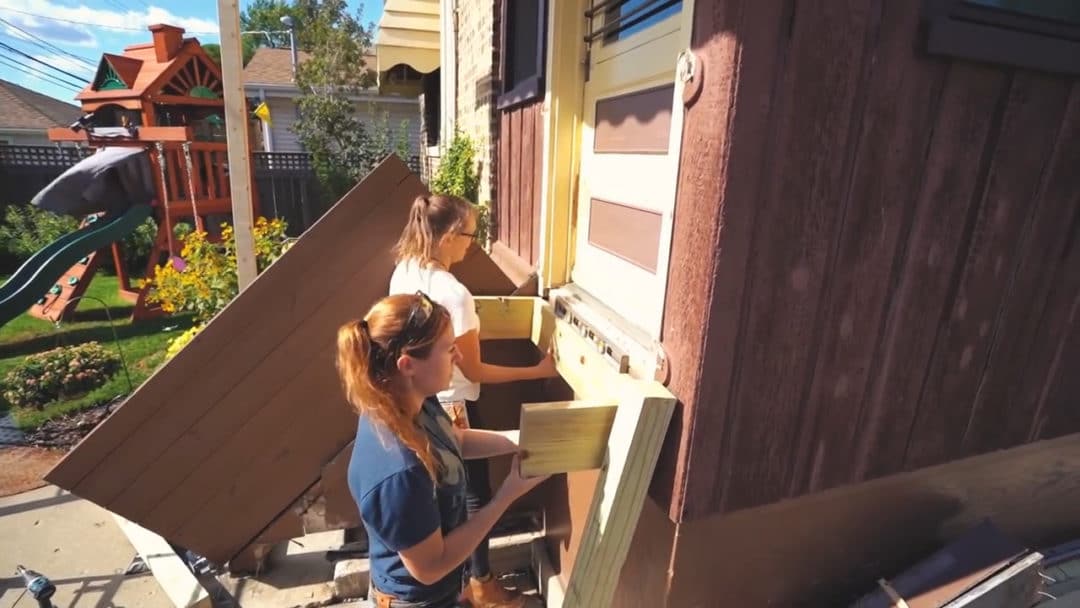
After making sure it was level, we attached it to the house, then started figuring out the location to set the supporting posts.
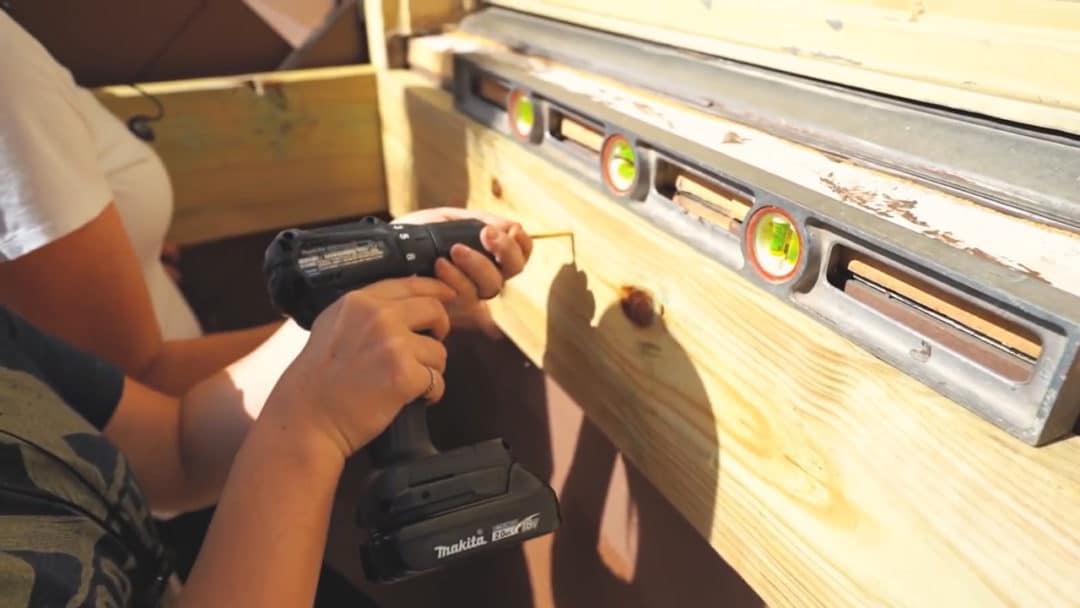
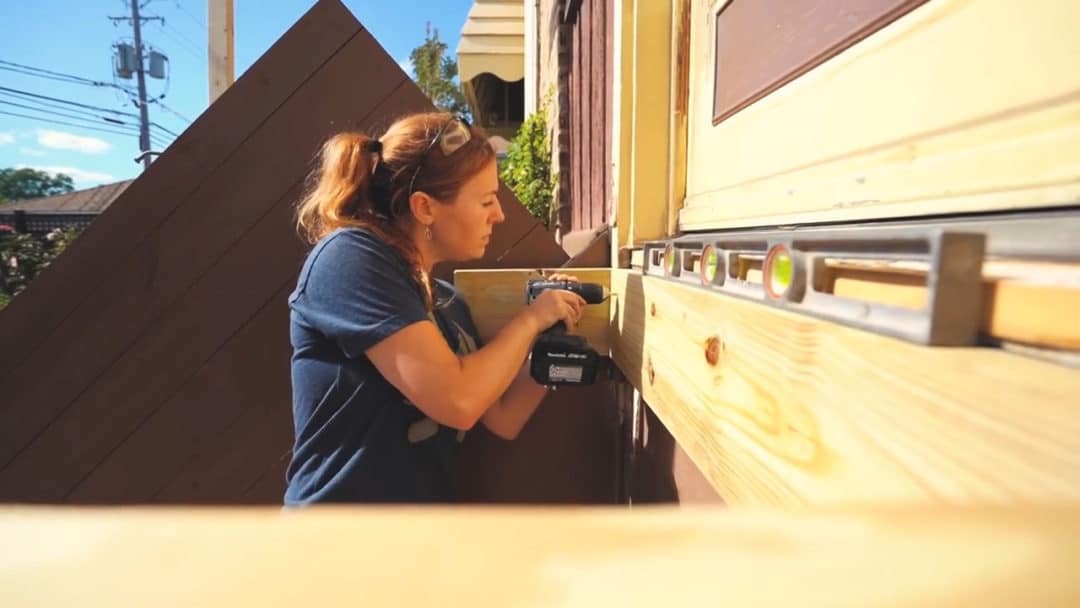
We will be using a post base bracket to anchor the post to the ground and also elevate it up off the ground. We plumbed and then temporarily attached a 4×4 to the header using some Bessey Klikclamps, to mark the location of the post bracket below it.
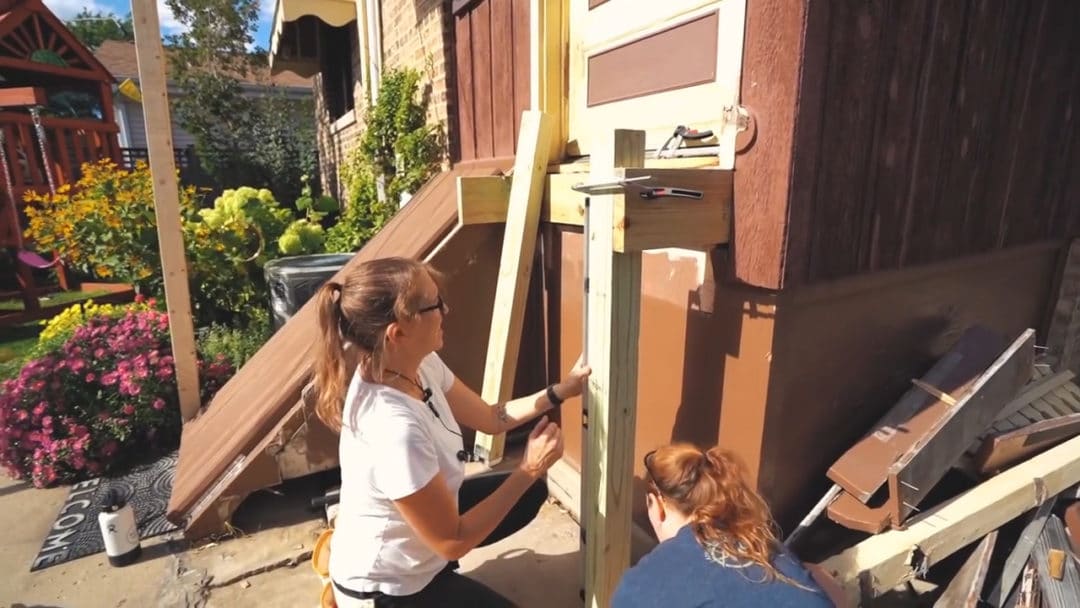
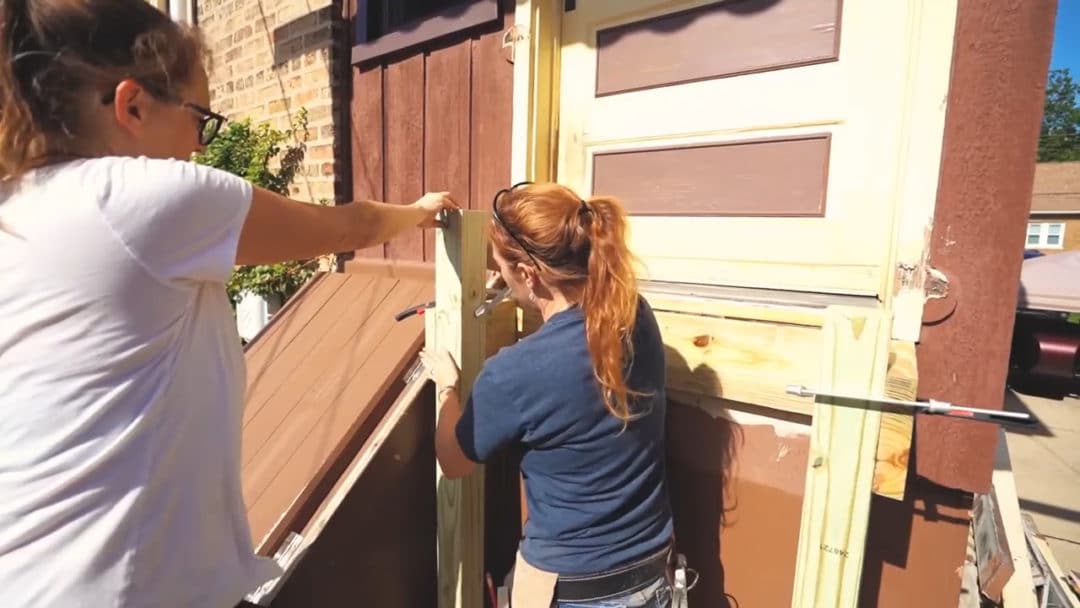
Once it’s location was determined a hammer drill was used to drill a hole in the slab to place a concrete anchor.
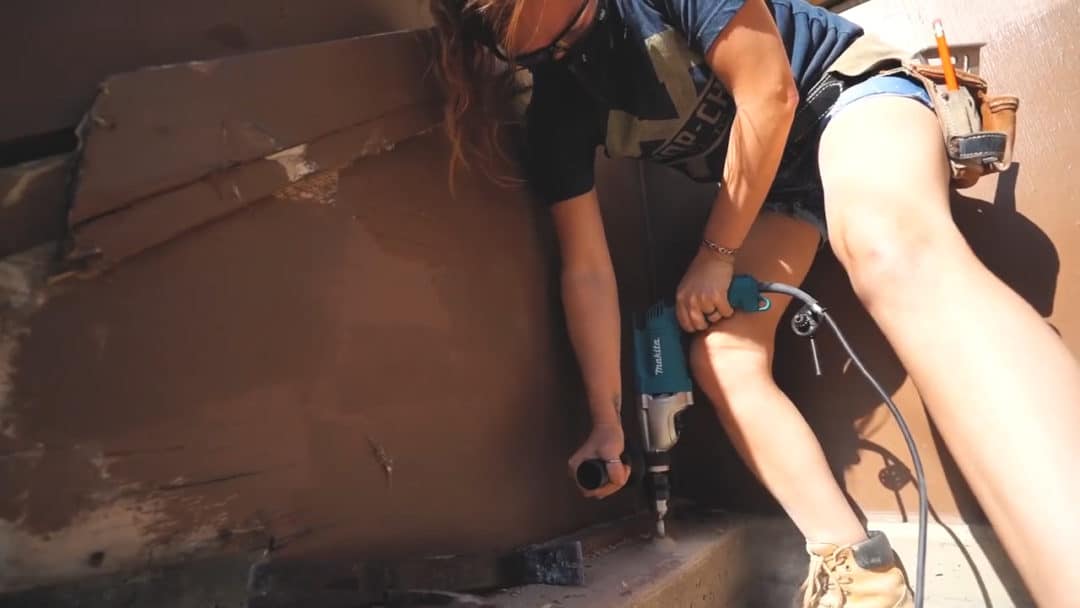
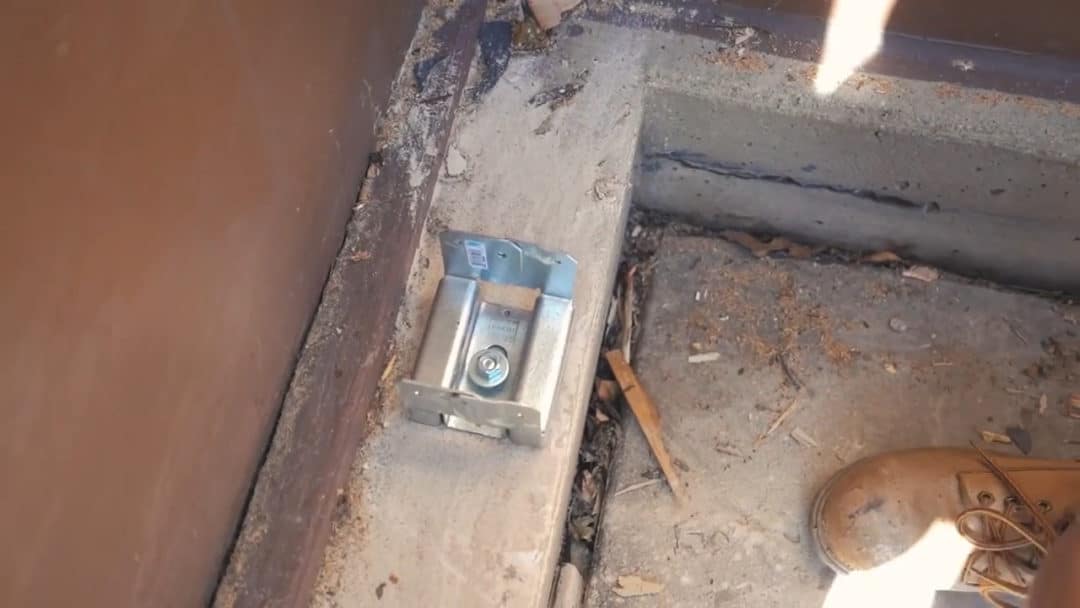
This goes into the center of the bracket to attach the bracket to the ground, then the post can be set on top and attached to the post. This is much easier to do with two people as one can be reading the level to plumb up the post while another drives in the screws.
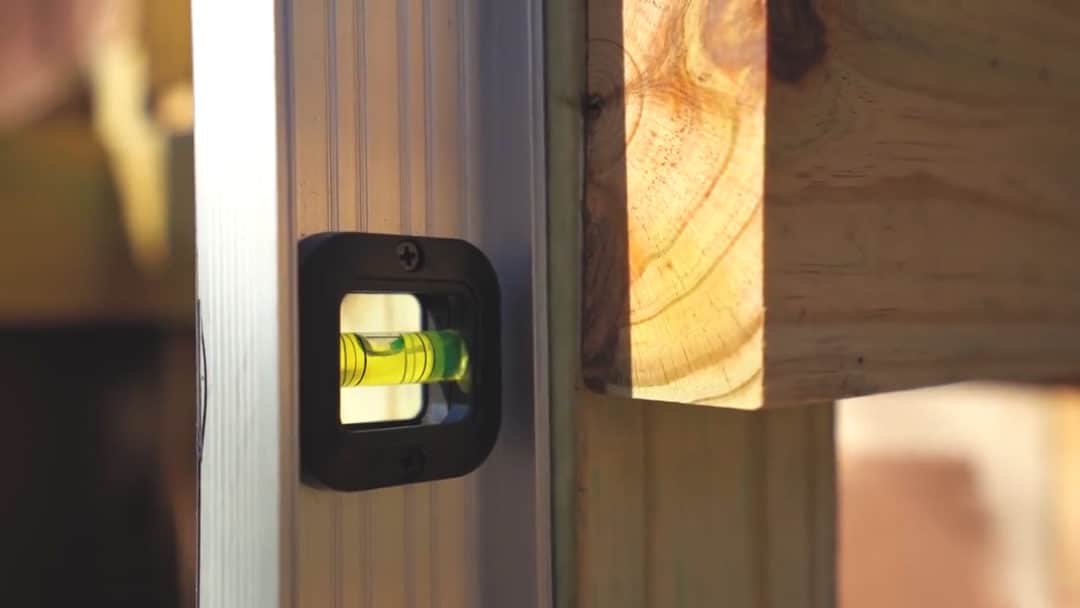
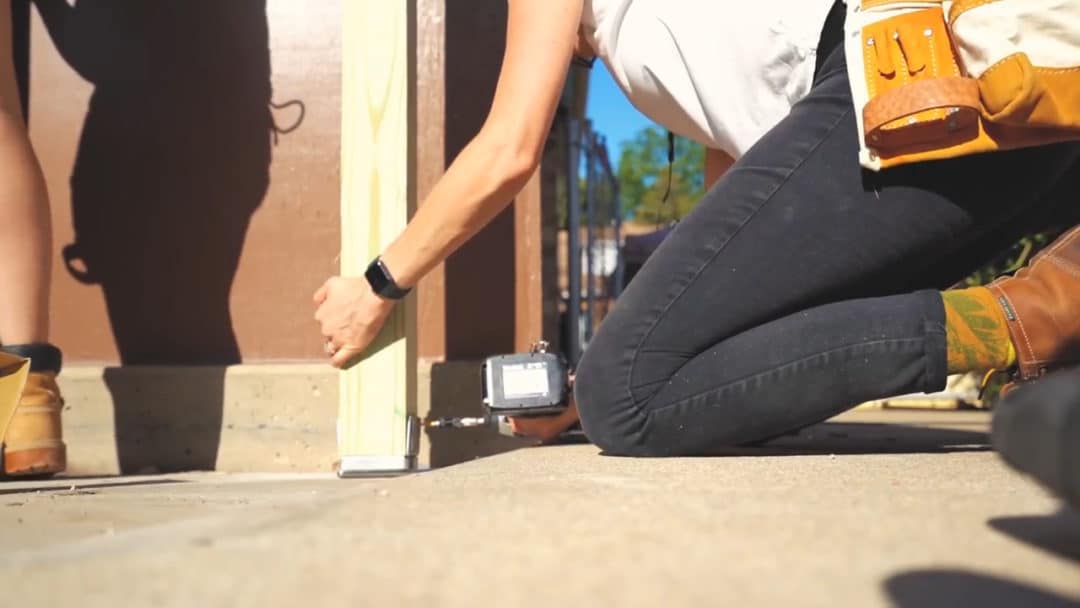
Also, even though these are on brackets, I would still recommend using treated lumber.
Now a front framing member made from 2x material can be added to the front to complete the landing framing.
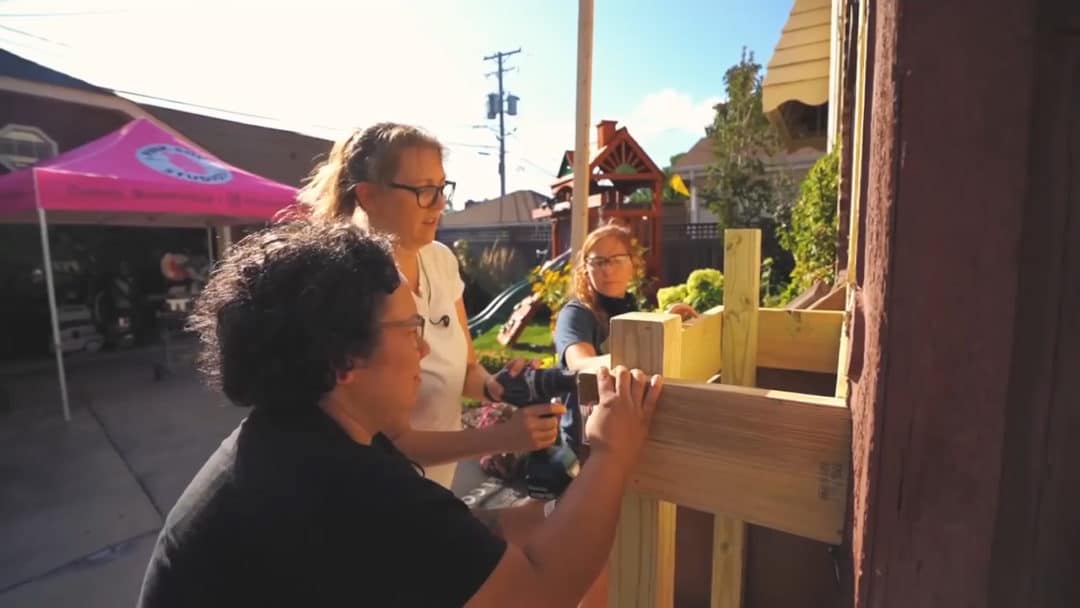
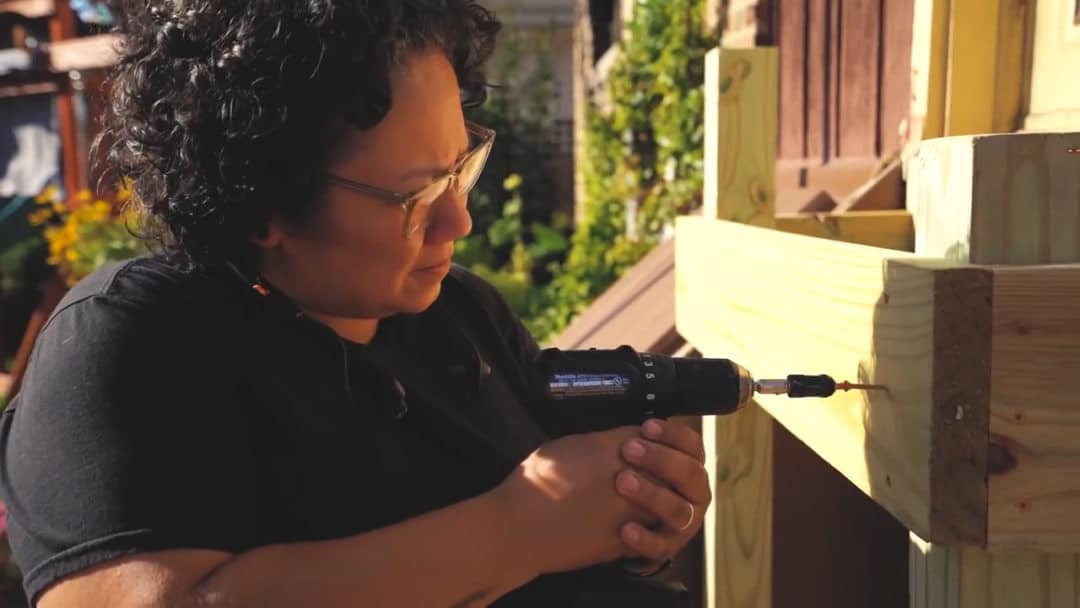
So now we could cut the posts to the actual height needed which is flush to the top side of the 2x material. I used a circular saw to eat through as much of the material on these as possible, then Erin finished them off with a sawzall.
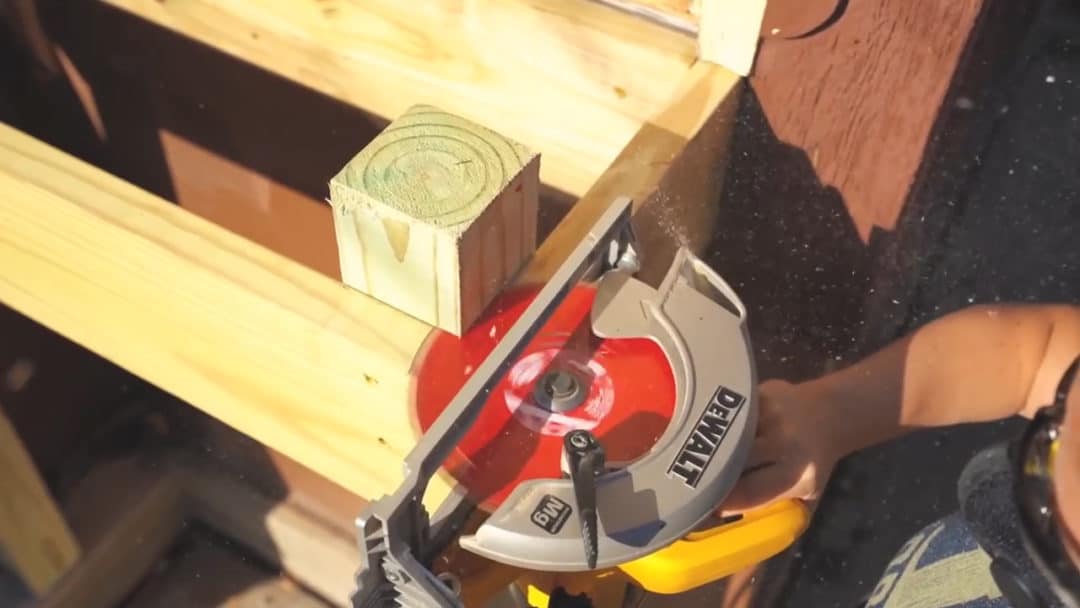
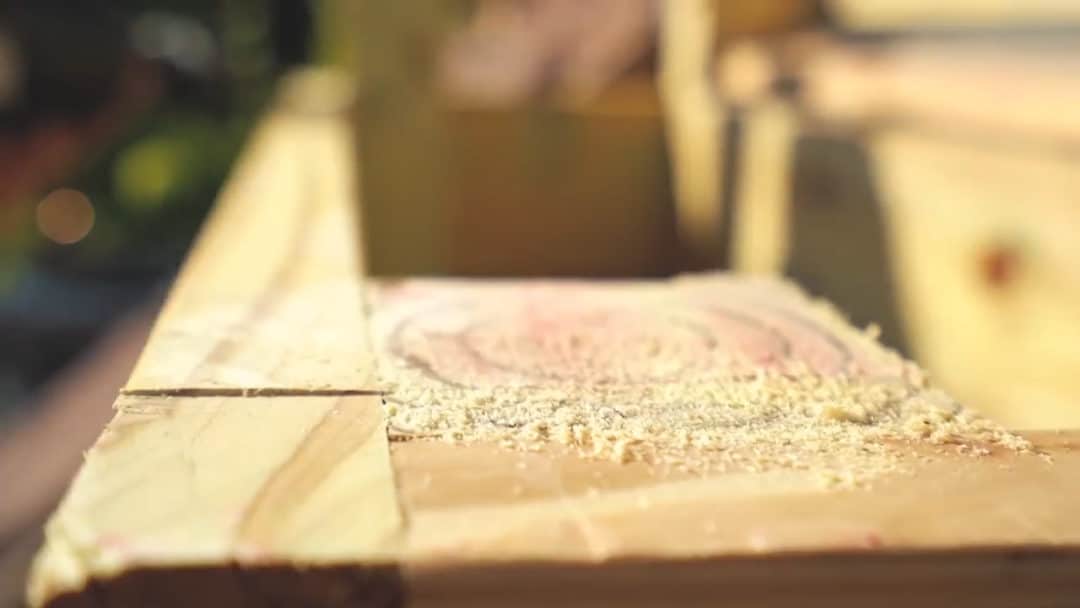
Oh I almost forgot the center joist, no problem through. We quickly threw in the actual last framing member of the landing which will help support the deck boards that go in next.
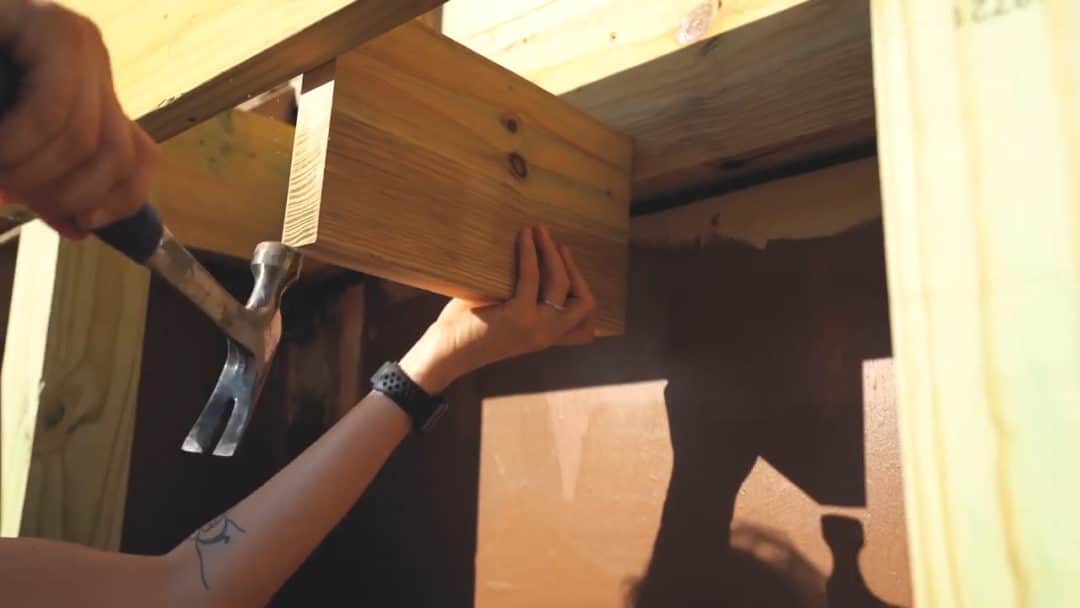
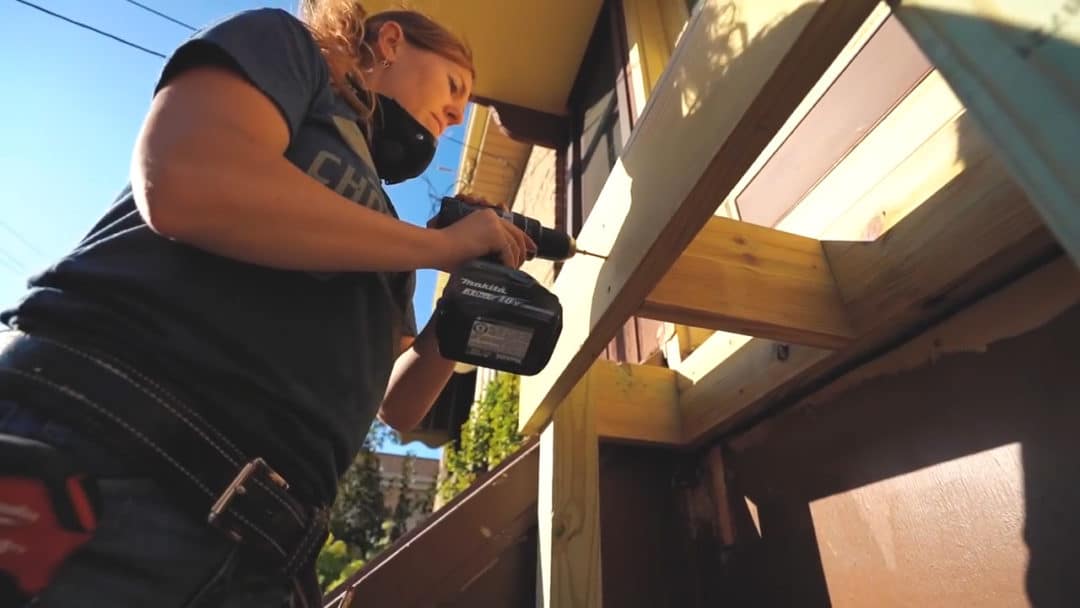
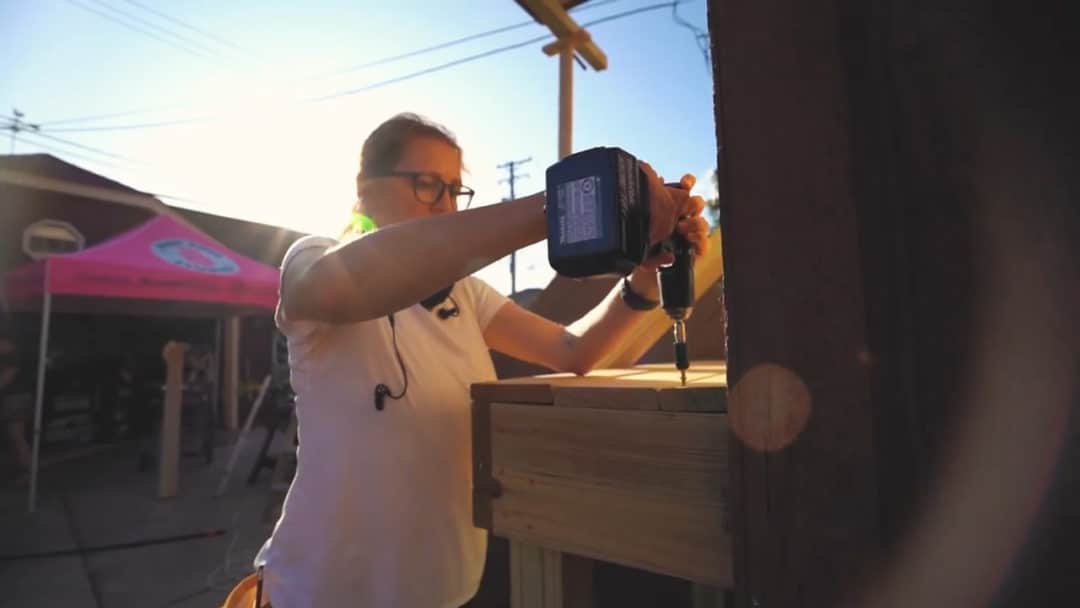
And that is the landing complete! So… moving on to the part I was sweating: laying out the stair stringers.
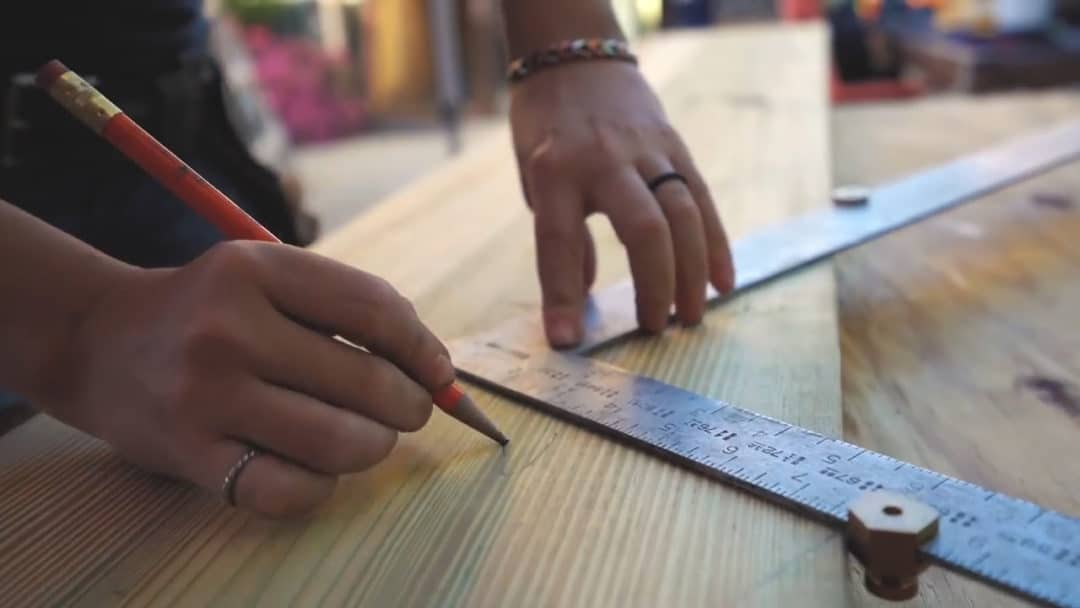
This part can be nerve wracking but it is a simple formula. I’ll link to the video down below that I think explains the steps to on how to do it very well. Things to keep in mind: again check out your code because there are mins and maxes for the rise and run. I made these with a 7 3/4” rise and an 11” run. The goal is to have all the steps the same. It’s funny how easily the body can tell when a step is off from the others but it also creates a hazard if they are off, so it’s more than just an aesthetics thing.
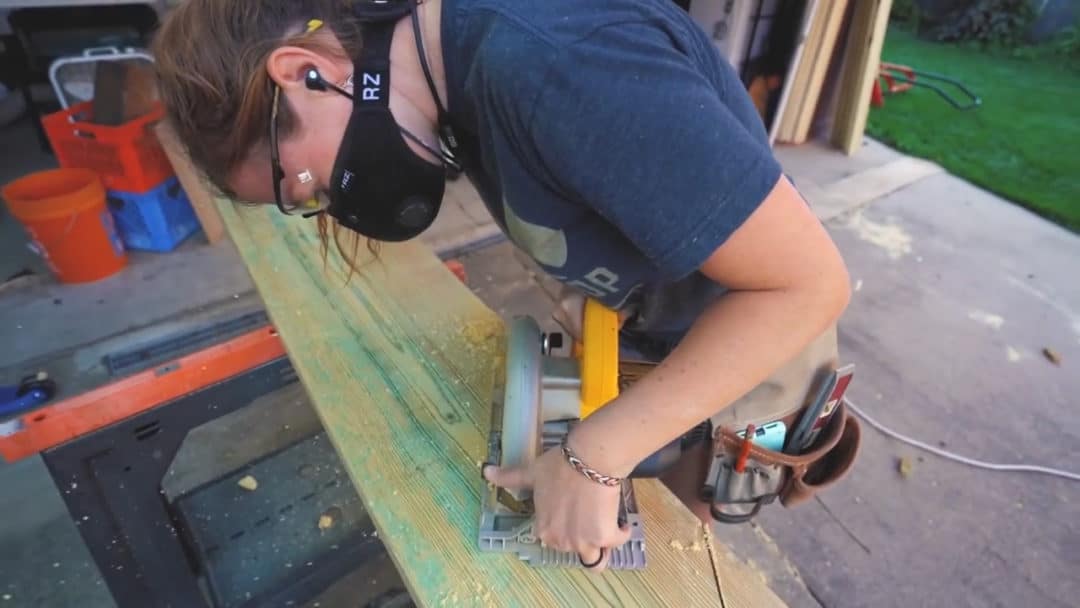
You can see it’s being cut out from a treated 2×12 and I started with a circular saw making all the cuts in one direction before changing my stance and making all the cuts going the other direction.
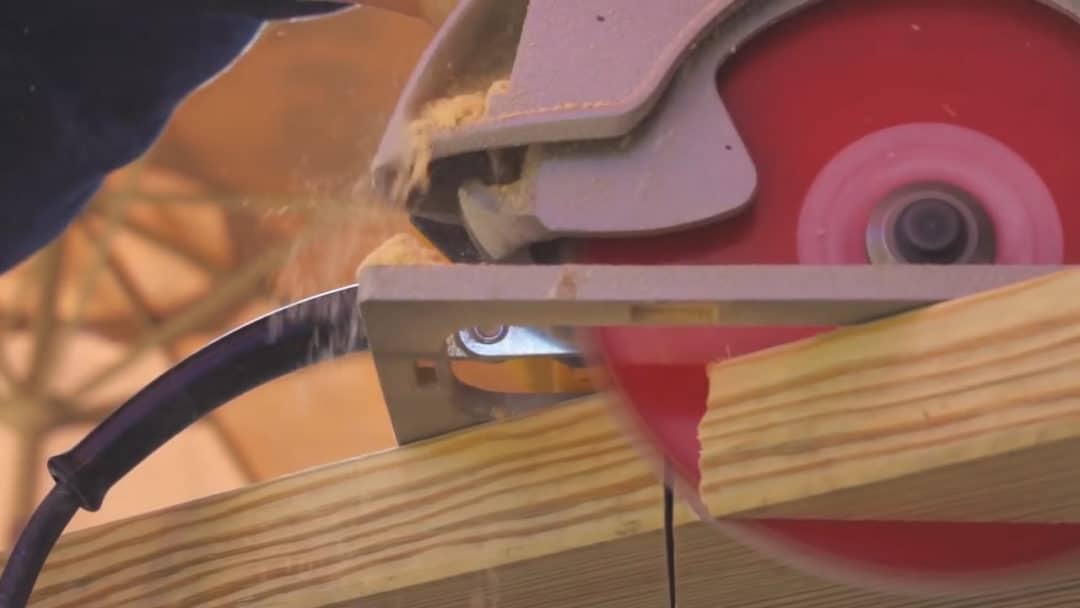
Some people will overcut their line here in order to make the cutting go quicker but the better way is to cut up to your line on both directions then come back with a jigsaw or sawzall to complete the cut and drop the part.
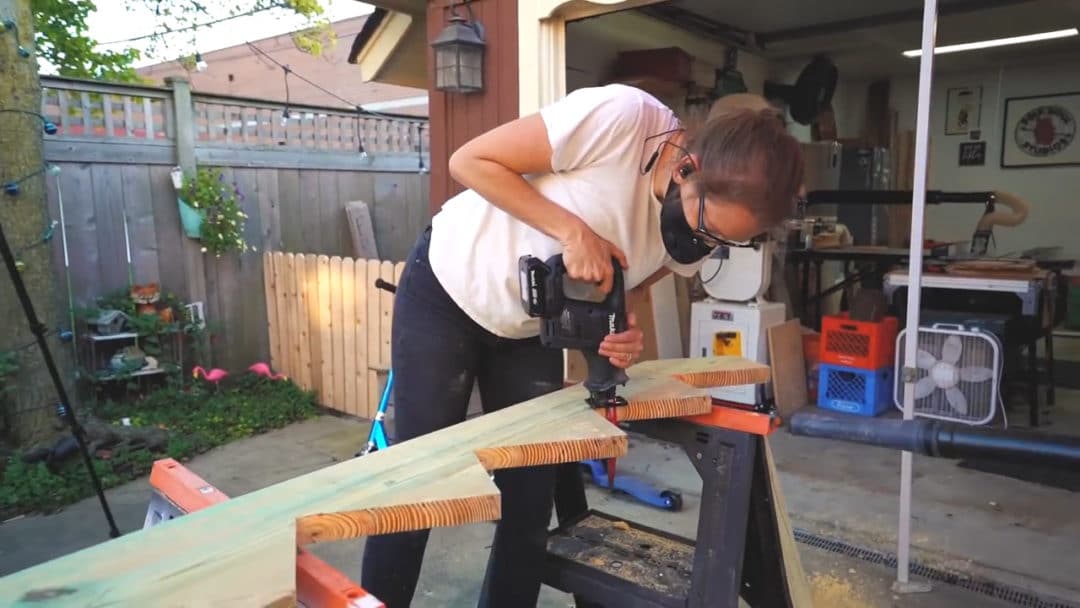
After getting one stringers cut out, we tested it in place to make sure it was correct before making more. You can use the first one as a template for the others needed. This is a 36” wide staircase so we put in three stringers.
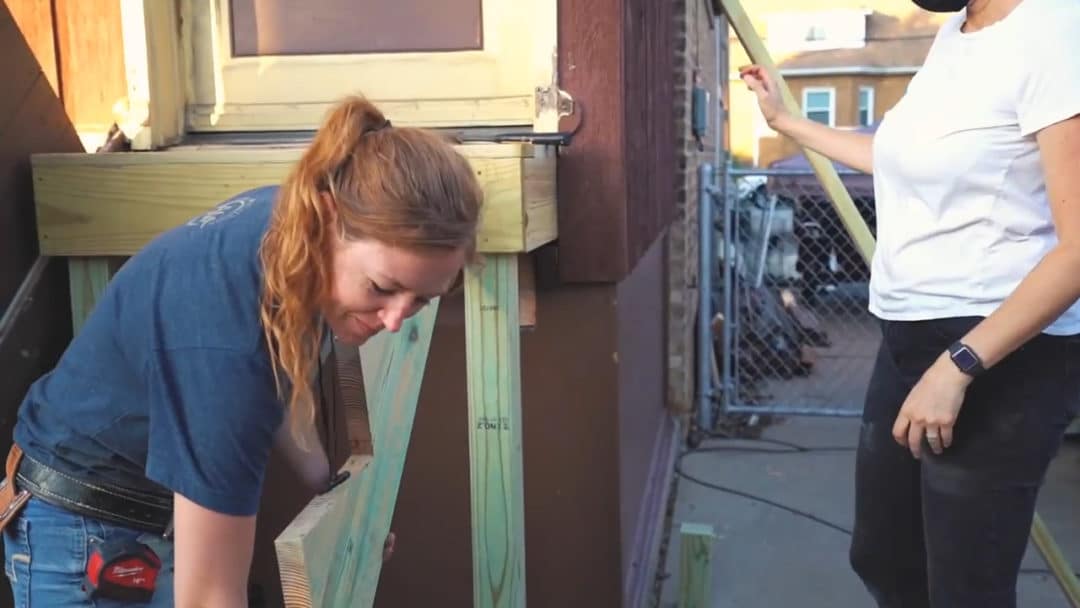
While I cut stair stringers, Erin started cutting the treads and risers that we’ll need later on. Then Alma started painting as we fed her parts. If you have the time, I definitely recommend painting things before you assemble them. It’s not only easier to paint boards that are loose but it also gives them better protection as all sides can get coated.
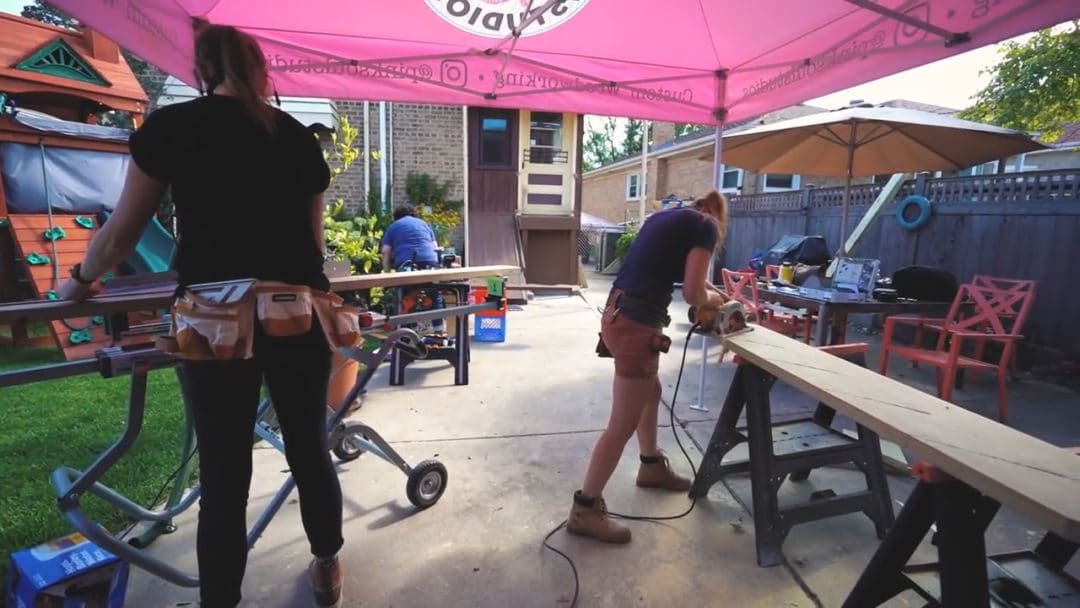
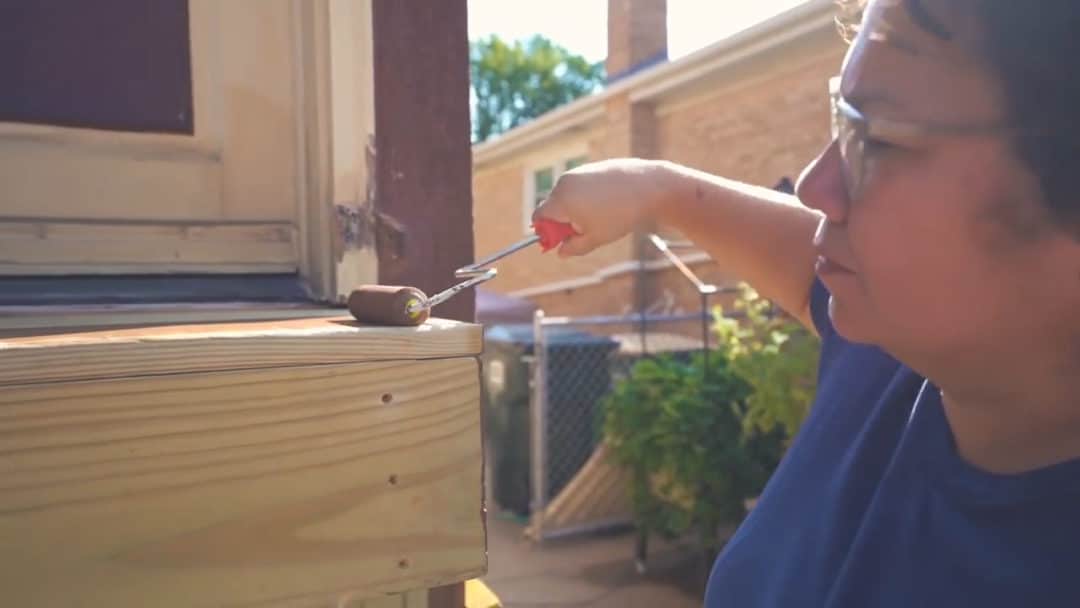
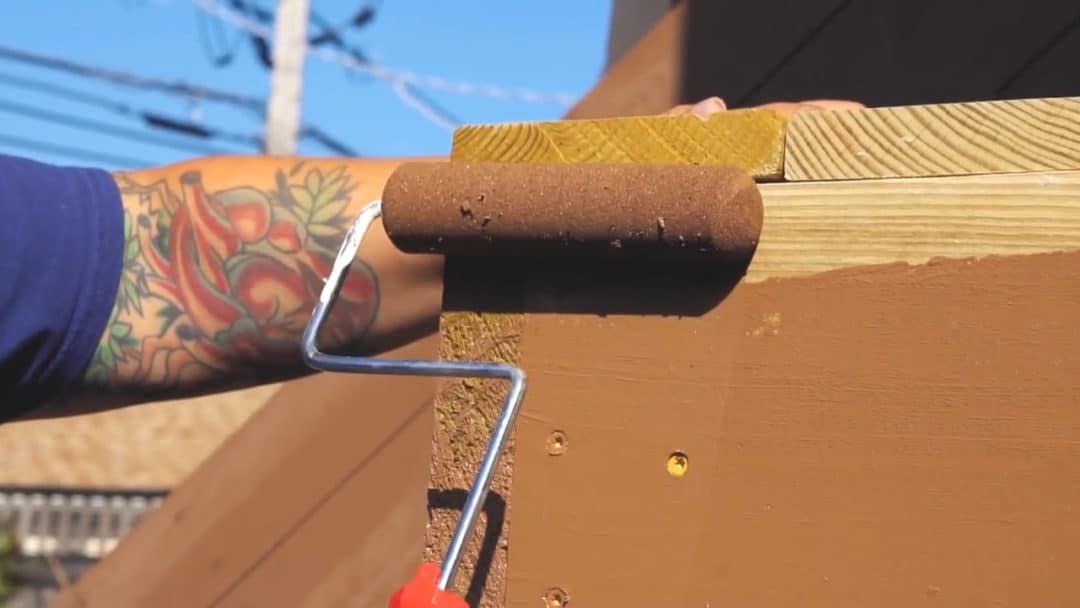
Now we were working in kinda a tight spot because there is a cellar door just to the left of the stairs. So even though the next step was to start attaching the stringers to the landing, we paused to drill the concrete anchor needed to set the post base. That way we could do this while we still had plenty of working room to get a body and tool in there.
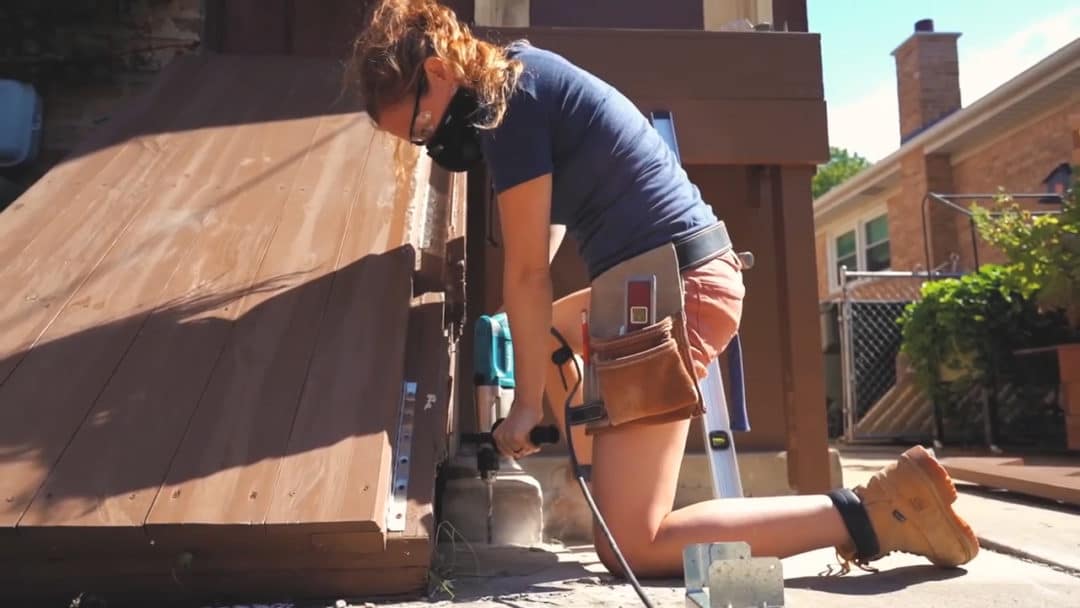
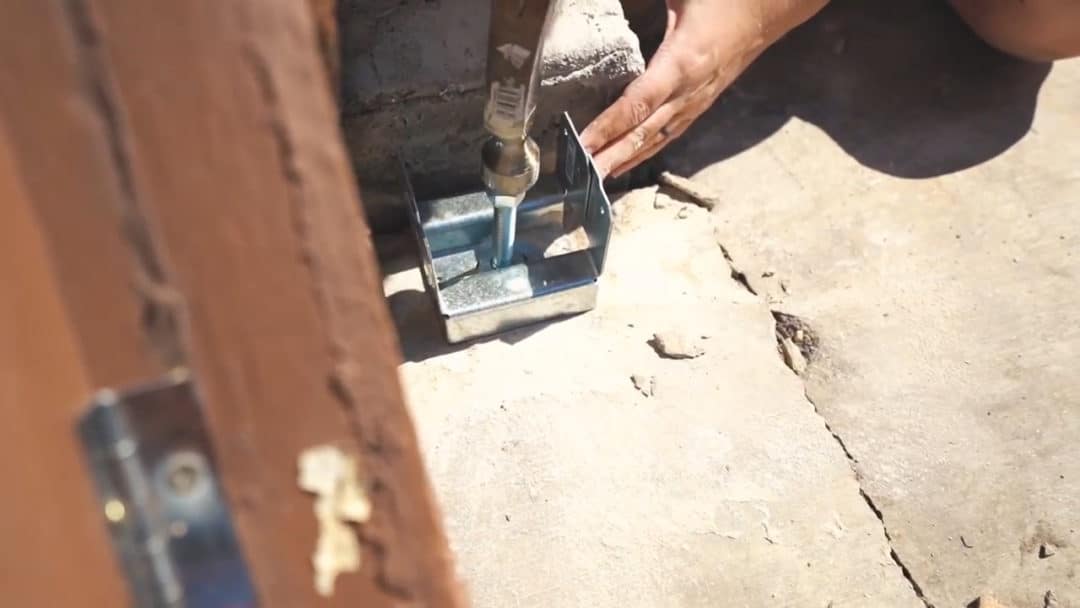
Once that was in, we started attaching the stringers.
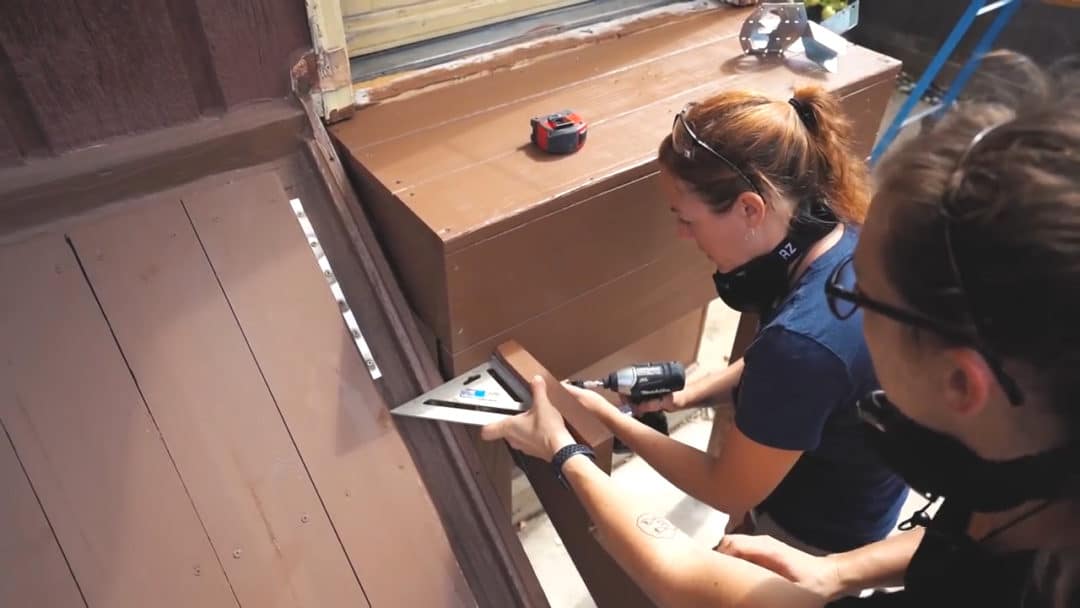
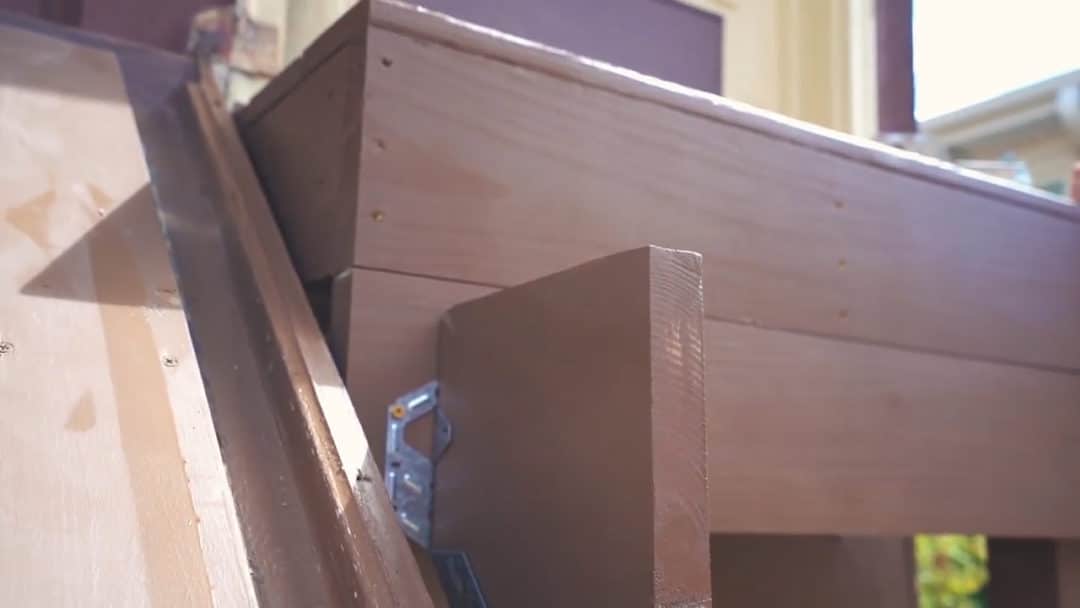
As you can see this is not flush to the end of the landing but is inset some. This is because I really wanted the 4×4 post to go all the way down to the ground instead of resting on top of a stair. Since you can’t cut through a stringer, we just moved it in so it would miss the post.
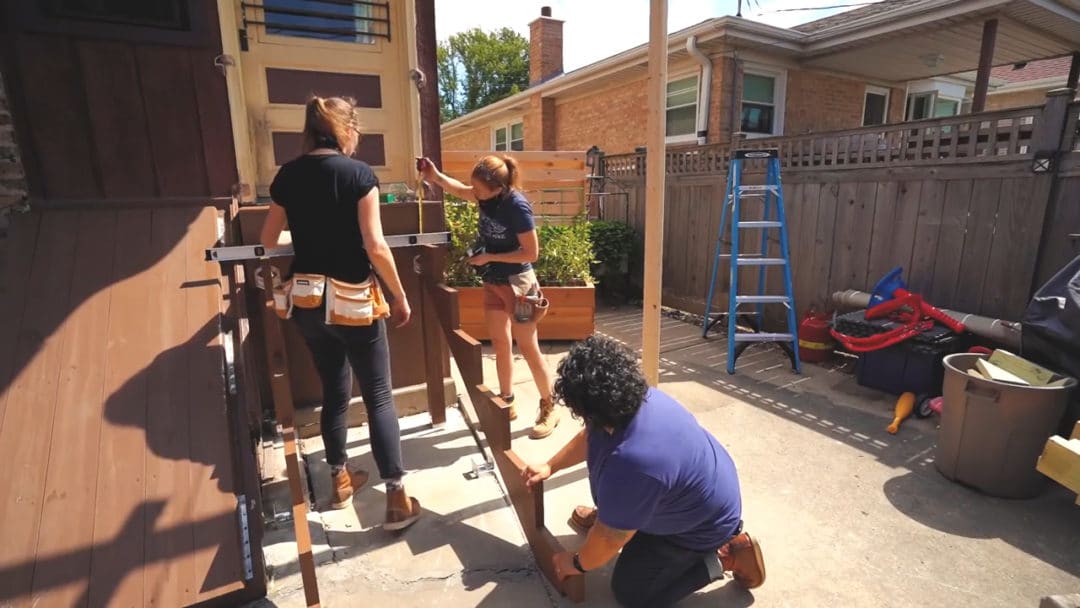
We did the same thing for the placement of the far right stringer. And you can see we are using these stair stringer hanging brackets. I’ve linked to all the brackets down below if you have questions on what was used.
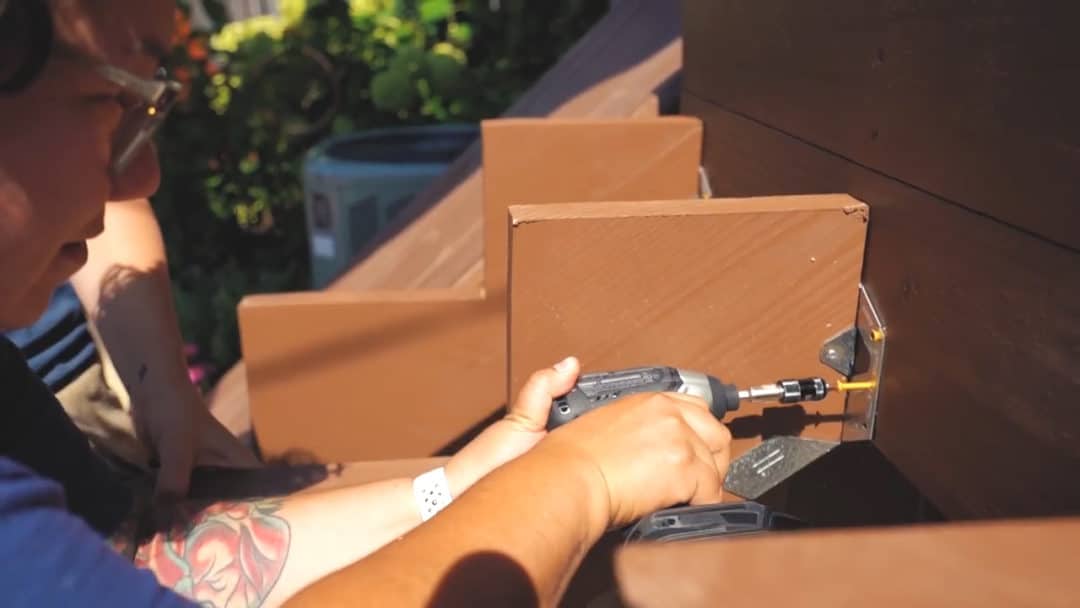
Now to anchor the stringers down to the concrete we inserted in a 2×4 in a cutout at the very base. This is something you can mark and cut for when you’re making the stringers.
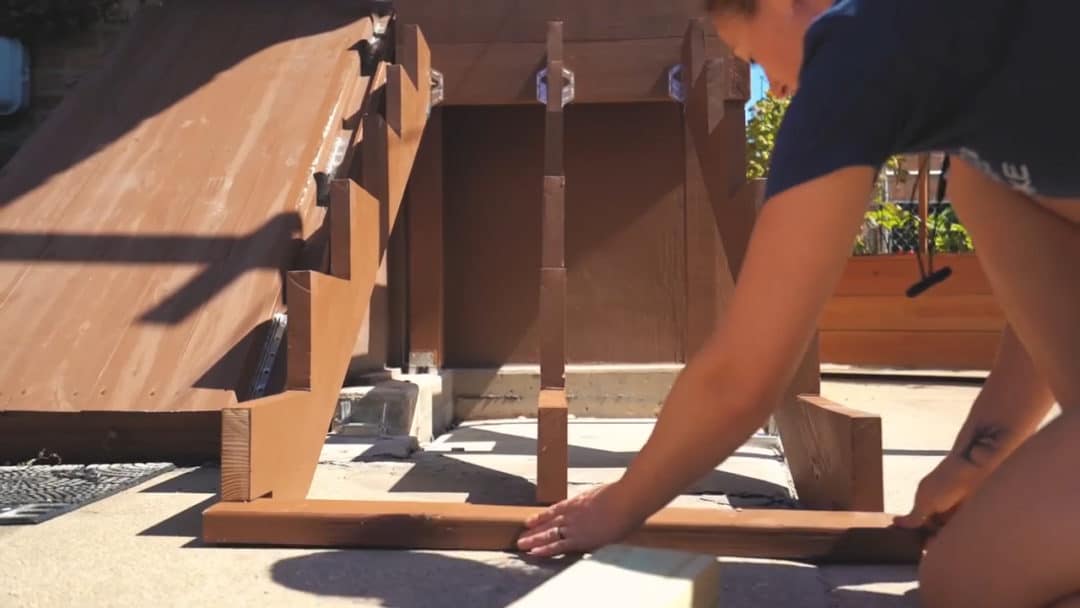
And now we can pre drill (using a concrete bit) then drive in some masonry screws.
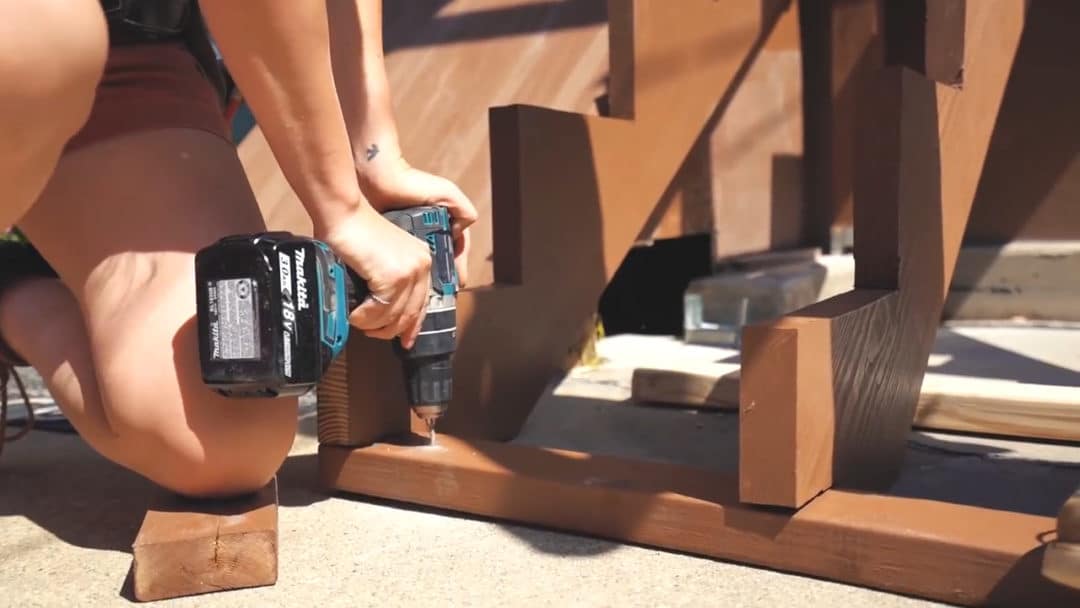
From here it goes pretty quickly. Next we needed to throw in the posts, so after giving them a quick coat of paint, we cut them to size and positioned them on their brackets which we already attached to the ground. Of course being careful to avoid hitting the header, each other, or the house in the process.
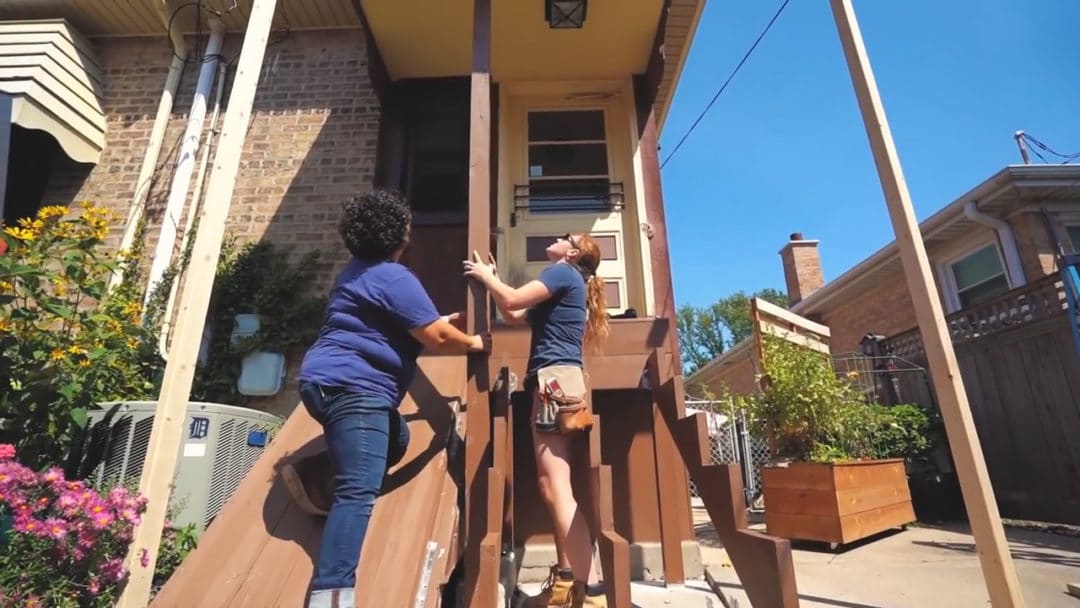
Once the posts were upright, we would throw a level on them to get them plumb then attach them with screws at the base first. Then still reading the level on two of the faces, Erin attached it to the underside of the awning. We used two screws per side here, making sure to hit the rafters in range.
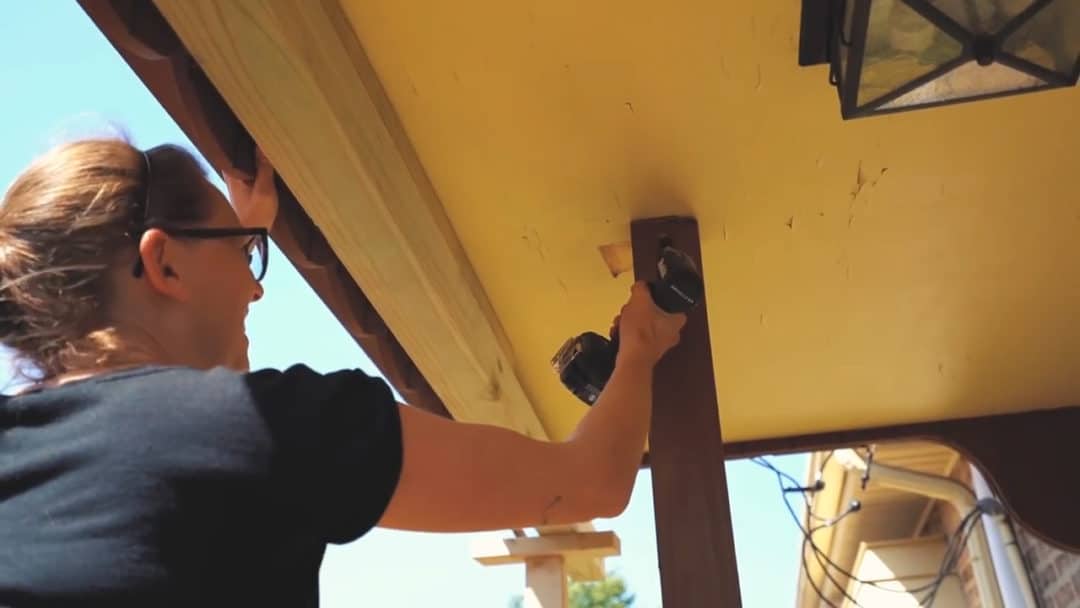
With those two main posts in, the header and it’s two props can now be removed. We hopped up on ladders to first take out all of the screws holding the header up to the awning then with Erin and I ready to support the beam, Alma kicked out and removed the vertical props. Oh and incase you’re worried, that is a phone line in the air, not power.
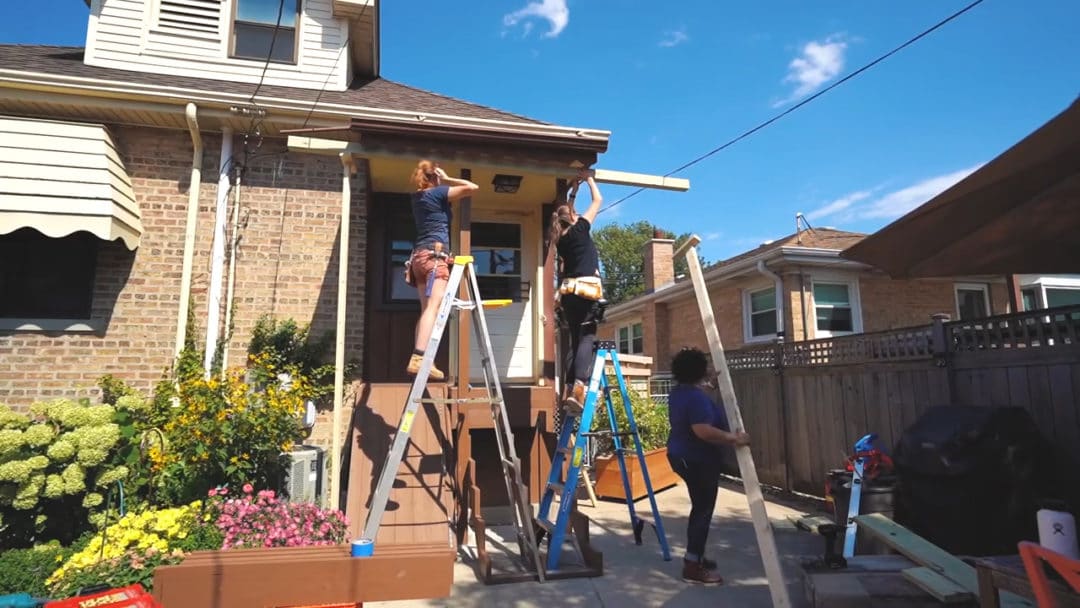
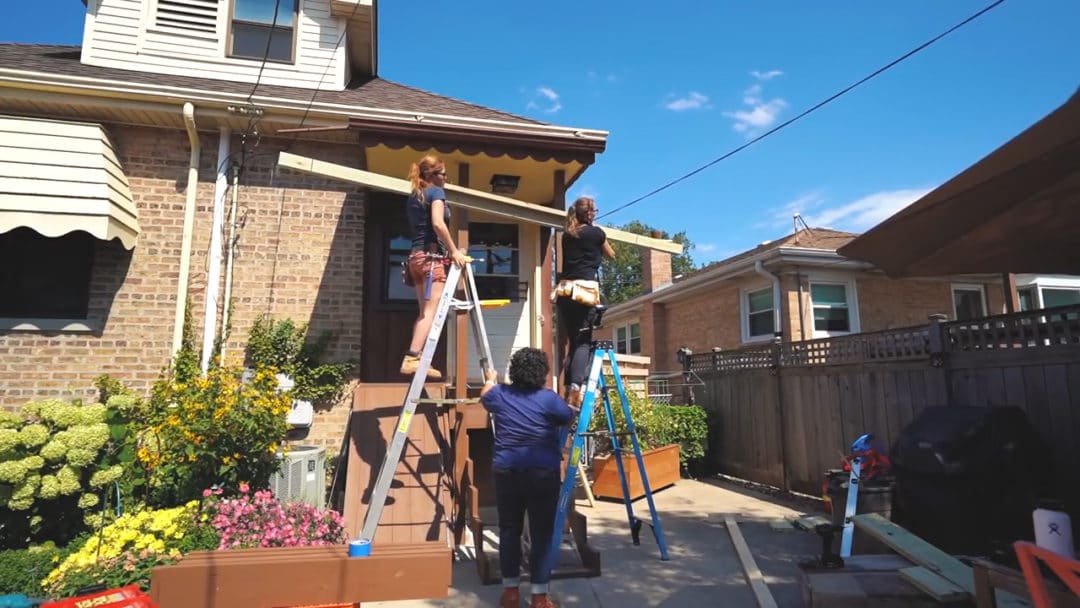
Before closing in the stairs, we took the opportunity to drive in a few screws on the inside of the stringers to tie them into the two posts.
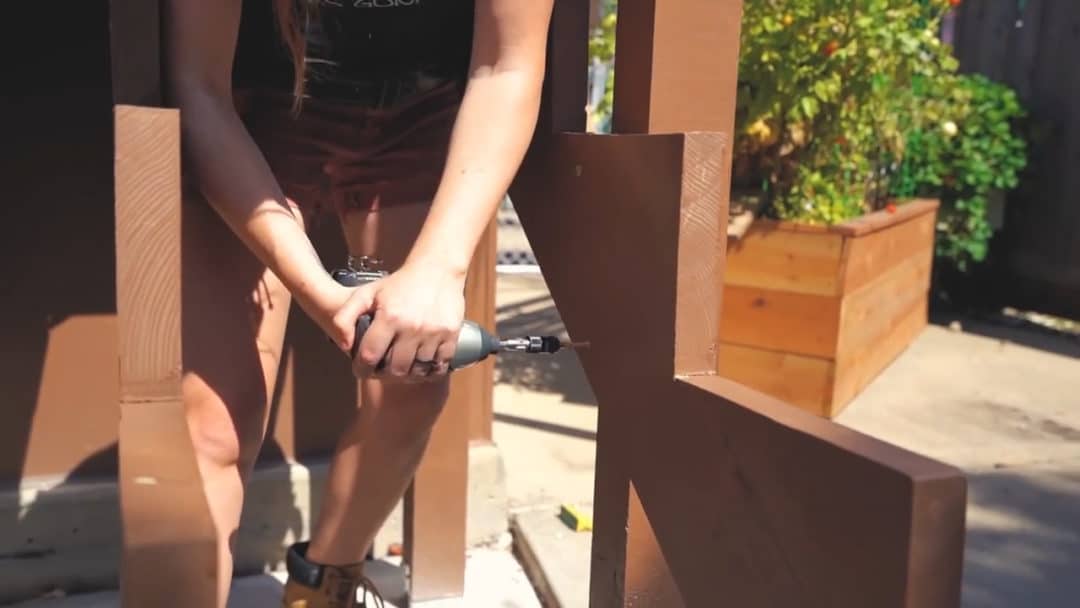
Then we started attaching risers which are the vertical boards of the steps. And this is where things really start to fly. We already had these boards cut and painted so we could very quickly just throw them in place and secure them with screws.
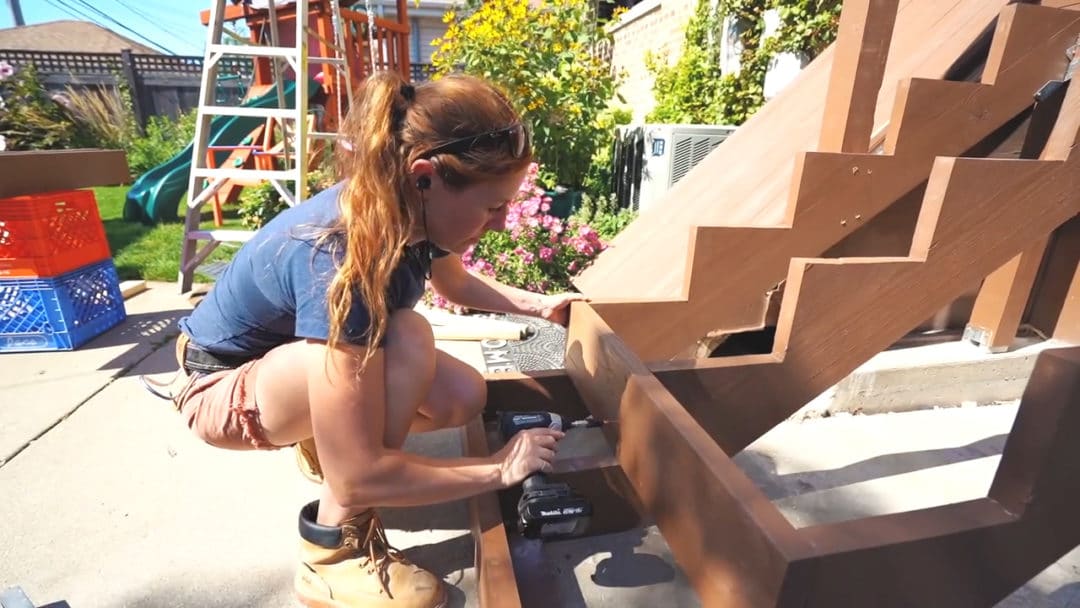
After the risers come the threads, which are the horizontal boards on stairs. These are attached the same way, by a few screws into each stringer.
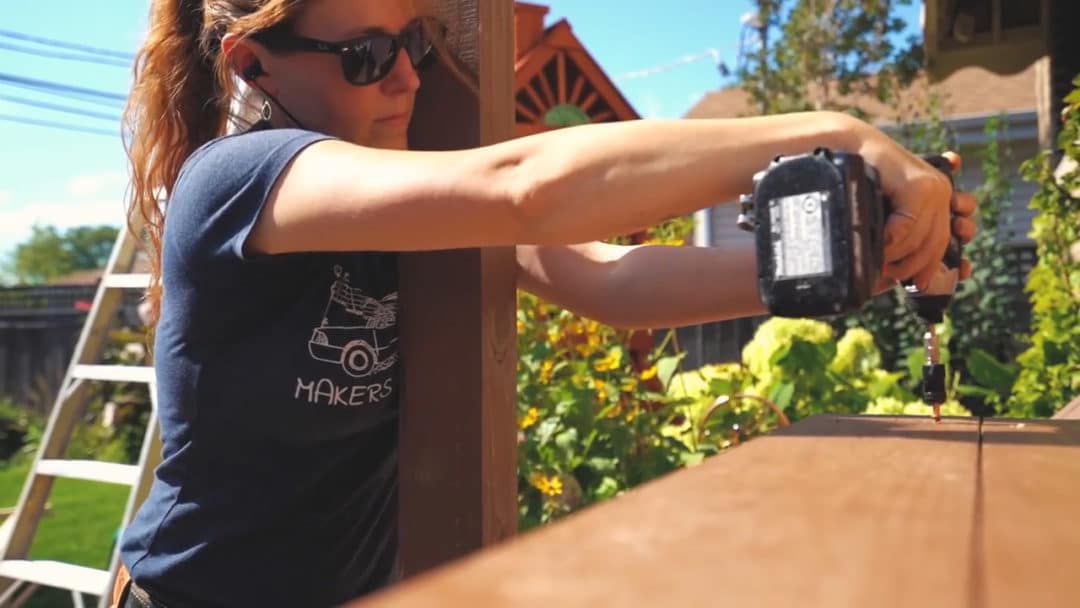
For these you can use two boards to make up the distance as we’ve done here, or you can use a single wide board.
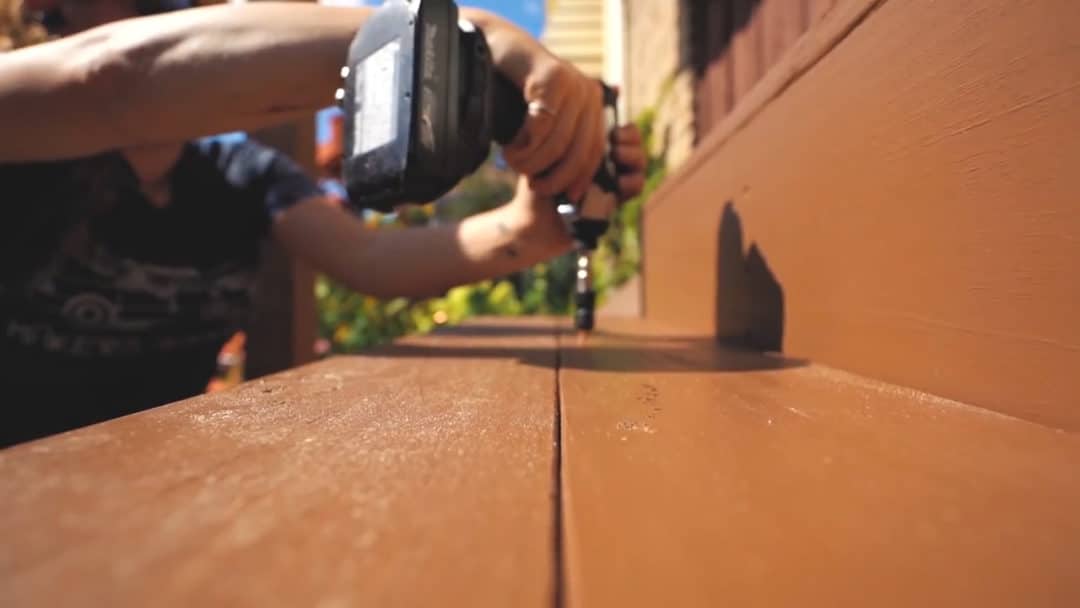
Then just a tip for you, you can lay down some construction adhesive under the threads to prevent squeaking in the steps. Then another tip to work quicker is to cut a spacer from a scrap to the length of your overhang on the side. This way you can use the spacer to line up the next board instead of pulling a tape on each one.
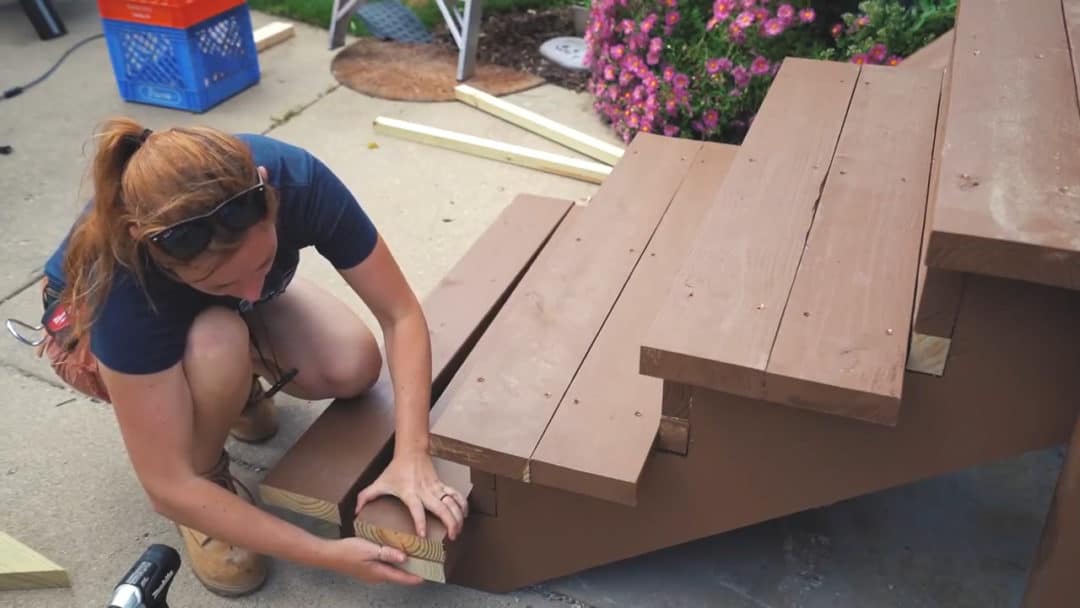
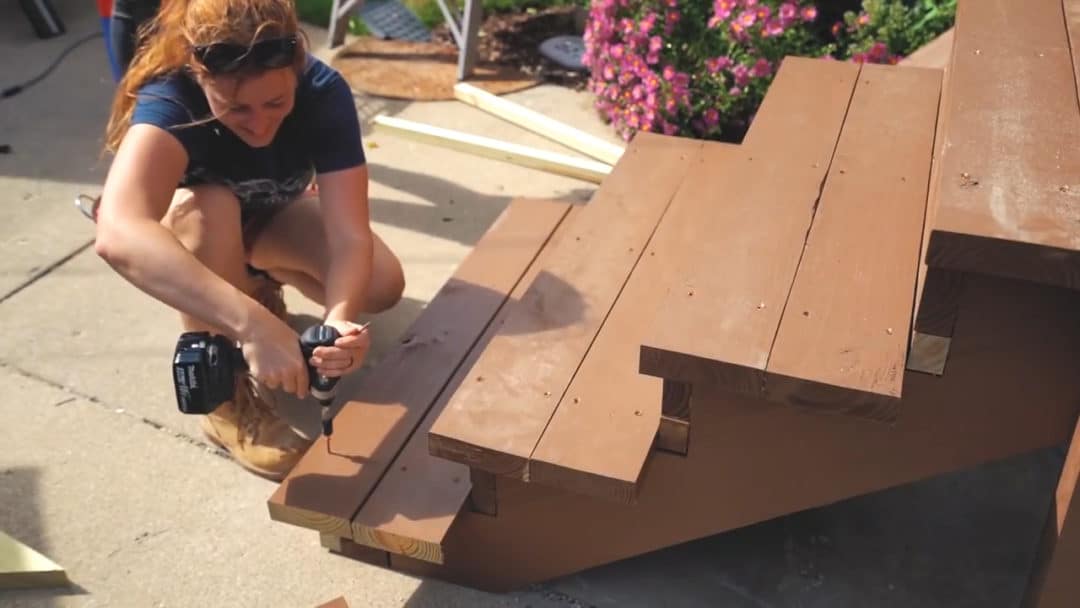
It’s a pretty exciting stage when you can go up and down the steps for the first time. It’s Alma’s house, so she did the honors of trying them out first.
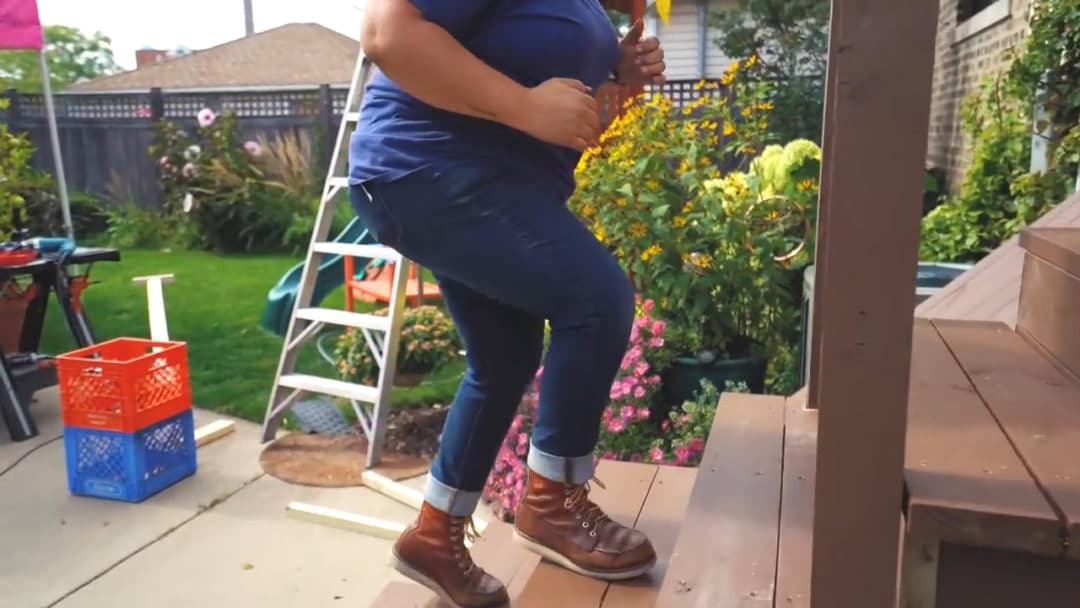
Originally the tall posts were on the second to last step, which is where the handrail ended, which was fine. However now that the steps were all the same rise and run and we also added in the spacious landing, there were three and half steps past the posts which meant there wouldn’t be a handrail for this portion.
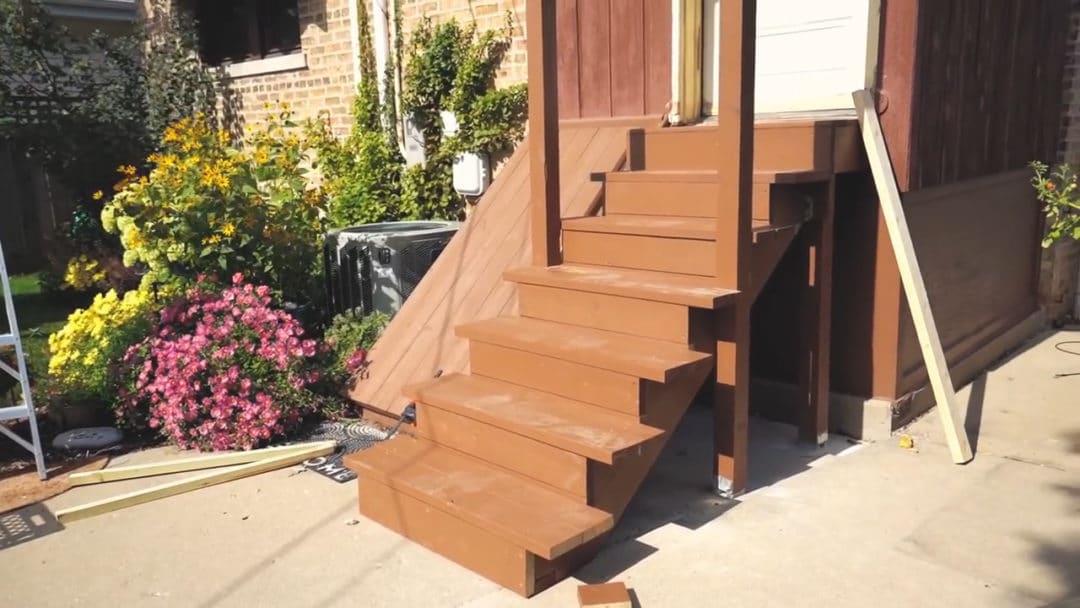
None of us were a fan of that so we decided to add in a few more posts closer to the bottom of the steps. While Alma went to grab more posts brackets for them, Erin and I stated on making and attaching the hand rail for the upper section.
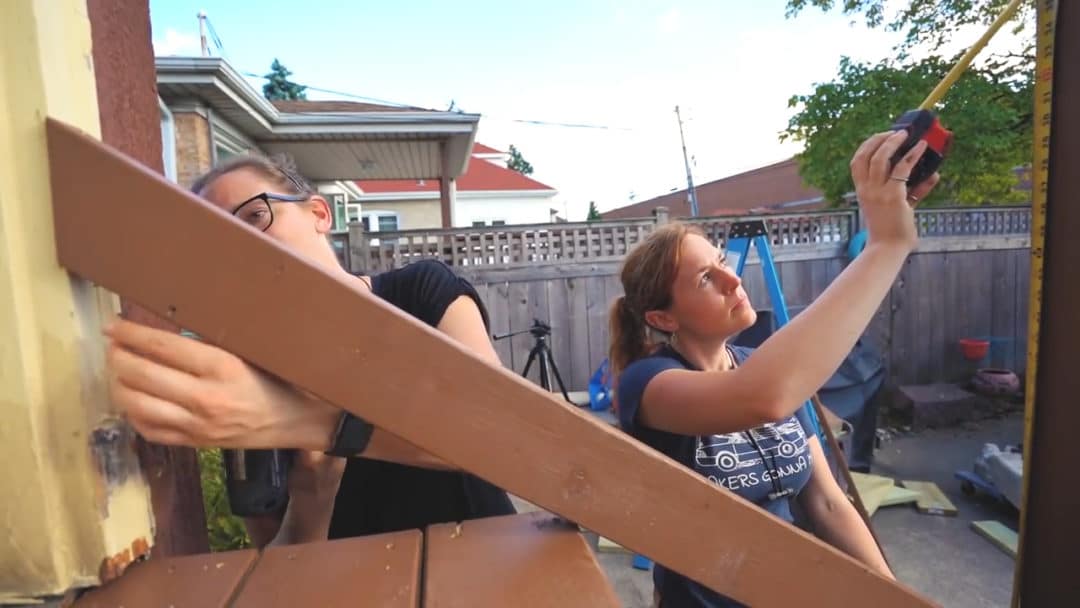
These are made from simple 2x4s that are angled and attached to the house as well as the 4×4 posts. Again painting before throwing them in to make life easier.
After getting the top and bottom attached, we started attaching the vertical slats. We used a spacer to make these evenly spaced a part from one another, would drive in one screw at the top plumb it up with a level, then drive in the bottom screw.
After getting the top portion done we moved to the bottom to repeat. Since we didn’t accommodate for posts here, we used a jigsaw to cut a tread so a post could slip in and butt up to the stringers.
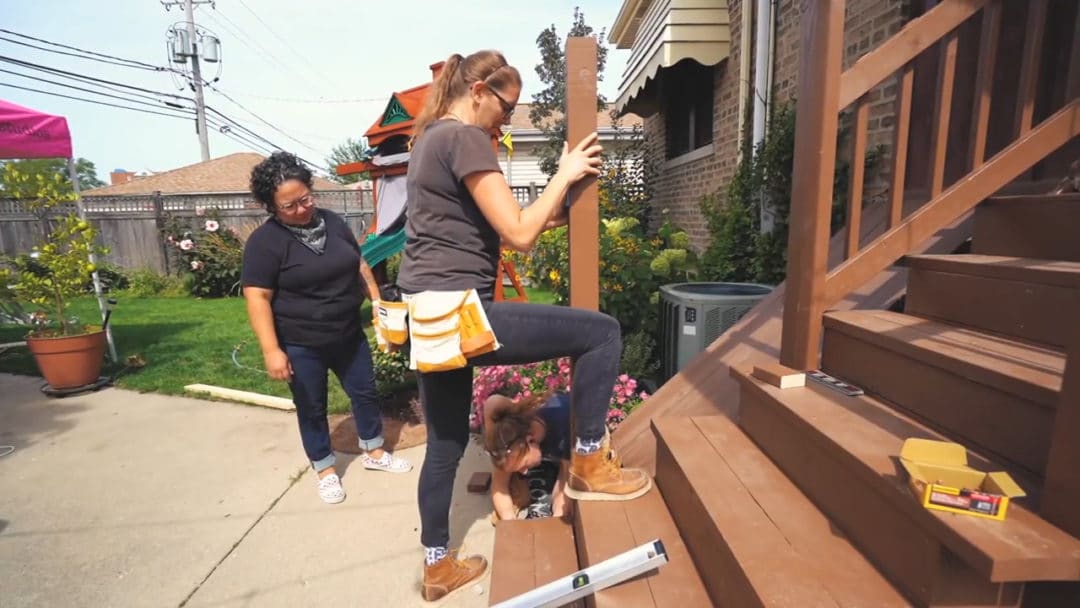
It was a little cramped getting to the inside of the stringers to attach it to the post, but I was able to wiggle in there.
Oh and just a tip, picking up a post level that reads plumb on two faces at once is a good investment in my opinion.
Again we left the posts long here so they can be cut to exact height after the hand rail is placed. We quickly cut and threw in the hand rails, the vertical slats, then cut each post to height using two cuts with the circular saw.
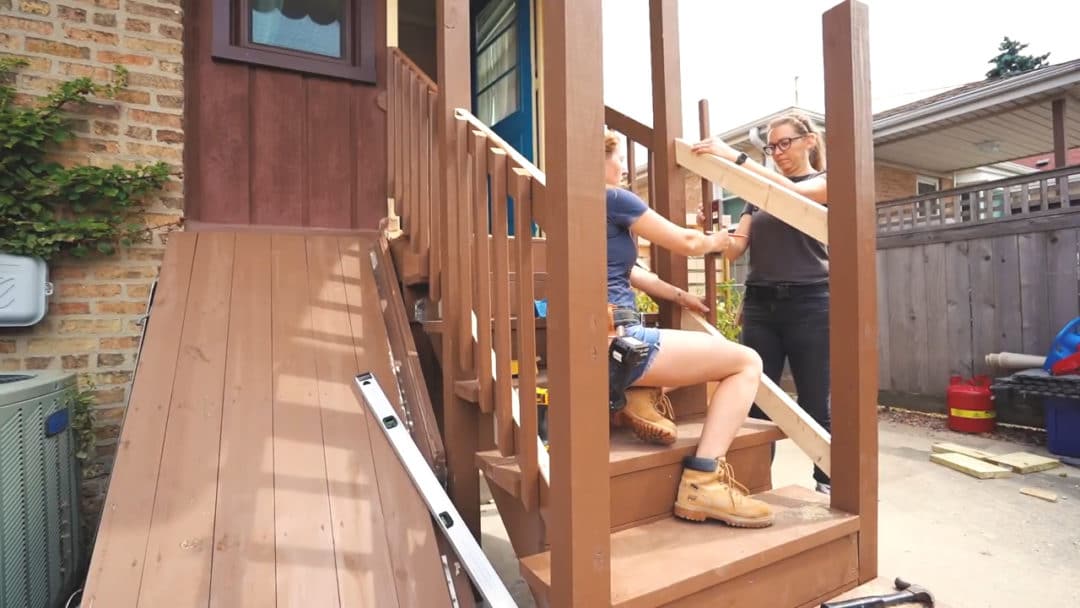
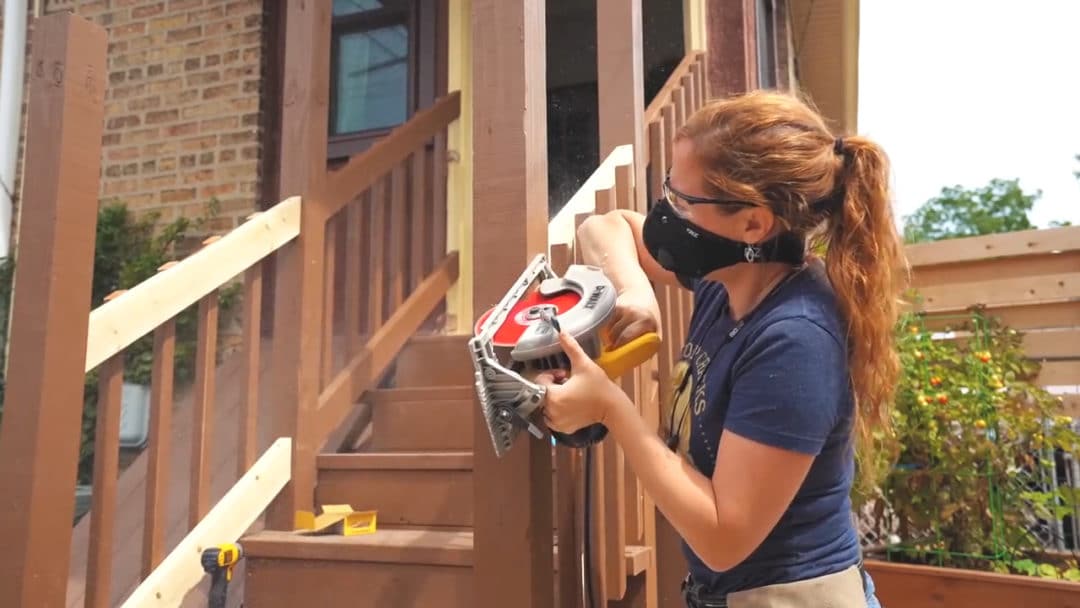
Last thing to add before calling it complete is a top cap on all four sections of the handrails, which we toenailed in from the underside to hide the screws from view.
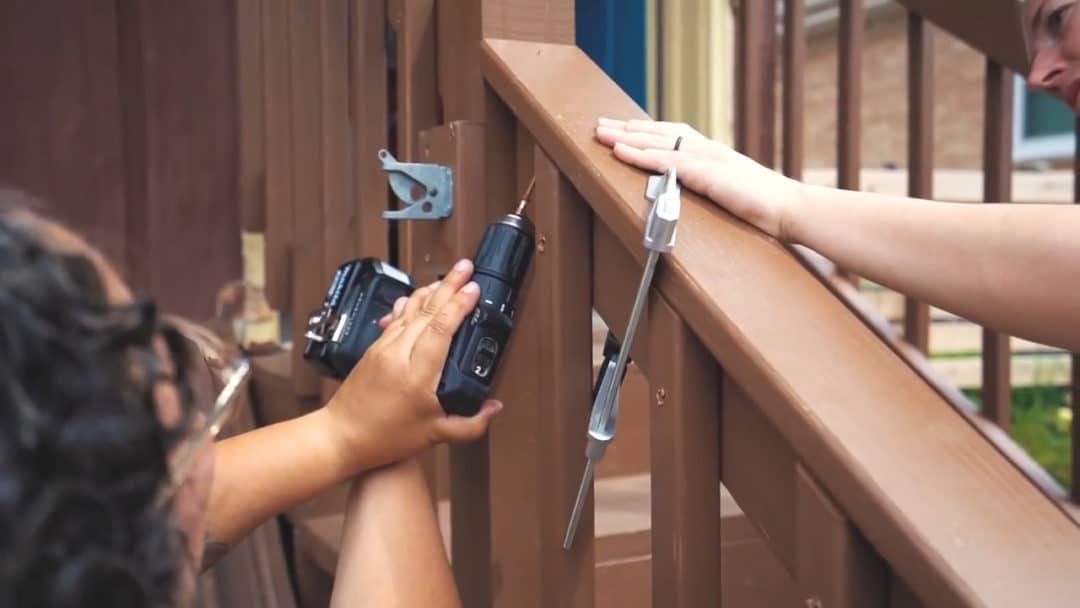
And there we go, a drastically more stable and functional set of stairs.

Not at all bad for 3 days worth of work. 3 strong women and new stairs!
If you have a set of steps on your to do list then I hope you found this video helpful. Of course each set up will be different but the basics are the same. It is an intimating project but all the obstacles that come along with building a new set or rebuilding an old set can be worked through so take your time and have some fun with it.
Find Erin here: http://bit.ly/2MqhFky
Find Alma here: http://bit.ly/2VXS1Gg
Find the videographer here: http://bit.ly/35QAy7d

(Most of the links listed above are affiliate links. As an Amazon Associate I earn from qualifying purchases)
One Response
Love watching you do practical home project and you’re an inspiration for “girl power”…but standing on the top rung of ladders…OMG! BAD April, BAD!
Comments are closed.